Text
The Yorkie Zoomies: Embracing Your Pup's Silly Bursts of Energy

Does your Yorkshire Terrier ever suddenly sprint around the house in a blur, skidding across floors and bouncing off furniture? Those unmistakable bouts of frenzied activity are affectionately known as "zoomies." While they may seem bizarre, zoomies are actually a normal, often entertaining way for dogs to burn off excess energy.
In this article, we explore the phenomenon of yorkie zoomies—what causes them, why they happen, and how to embrace these silly sprint sessions.
What Causes Zoomies in Yorkshire Terriers?
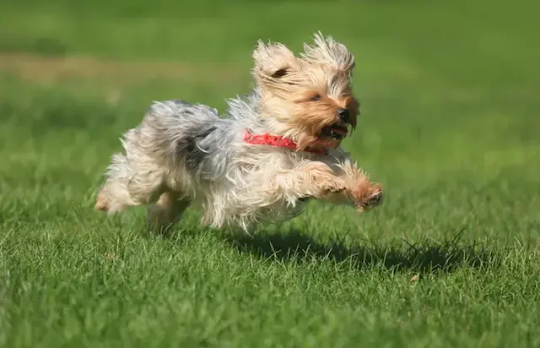
Zoomies can strike at any time but often occur after periods of inactivity or restraint. Yorkies are lively little pups who accumulate energy quickly. Zoomies allow them to purge that buildup through a brief cardio burst. Excitement, playtime, or even a good dog nap can all trigger a zoomie episode as your Yorkie's exuberance explodes into sprinting.
Some experts believe zoomies may have roots in the dog's wild ancestors, who needed to burn off energy after staying still while stalking prey. For domesticated yorkies, zoomies could be an instinctual way to expend any pent-up energy reserves.
Why Do Yorkies Get the Zoomies?
While zoomies look chaotic, they serve as a natural stress-reliever for dogs. Running in circles, jumping, and skittering around releases pent-up energy and anxiety in a primal way. For highly energetic Yorkies, zoomies prevent them from becoming overly restless or developing anxiety-related behaviors. Think of it as your pup's unique form of exercise!
Zoomies provide both physical and mental outlets. The short bursts allow dogs to exert energy, while the erratic movements and dashing around can stimulate and engage their minds. After a zoomie episode, most yorkies will feel calmer and more settled.
How to Embrace Yorkie Zoomies
Rather than trying to stop zoomies, it's best to just let your Yorkie burn off that energy safely. Puppy-proof rooms by removing obstacles, closing doors to limit running zones, and avoiding chasing or yelling at your dog, which could overstimulate them further.
Aiming to wear down their energy through regular walks, playtime, and activities can help minimize extreme zoomie episodes.
If a zoomie episode starts, simply move out of your pup's way and allow them to safely run their course. You can even join in the fun by moving around animatedly yourself to encourage their playful behavior in a positive way. Having a larger enclosed space, like a yard, can give your yorkie ample room to get the zoomies out.
Ultimately, the zoomies are simply your Yorkie's way of expressing their immense joy and vibrant personalities. Laughing at their silly zest for running amok is part of the fun! So sit back, keep them safe, and enjoy this amusing quirk that comes with owning such a lively, lovable breed.
Read the full article
0 notes
Text
Best Shampoo for Yorkies with Allergies: Top Picks for Sensitive Skin

Yorkshire Terriers, or Yorkies, are adorable and popular small dogs that are known for their long, silky coats. However, some Yorkies suffer from allergies, which can cause skin irritation, itching, and other unpleasant symptoms. One way to alleviate these symptoms is by using a shampoo that is specially formulated for dogs with allergies.
When it comes to choosing the best shampoo for Yorkies with allergies, there are several factors to consider. First and foremost, the shampoo should be gentle and free from harsh chemicals that can further irritate the skin. It should also be hypoallergenic and free from fragrances and dyes that can trigger allergic reactions.
Another important factor to consider is the type of allergies your Yorkie is suffering from. Some shampoos are designed specifically for dogs with environmental allergies, while others are formulated for dogs with food allergies. It's important to choose a shampoo that targets the specific type of allergy your dog is experiencing.
At Yorkshireterrierdog, we understand the importance of finding the right shampoo for your furry friend. That's why we spent hours researching and testing various shampoos to identify the best shampoo for Yorkies with allergies. In the following sections, we'll share our top picks and provide a detailed review of each one.
Best Shampoo for Yorkies with Allergies
PlayThis Yorkie Hates Bathing | Little Dog Takes a Shower
As dog owners, we understand the struggle of finding the right shampoo for our furry friends, especially when they have allergies. Yorkies, in particular, are prone to skin sensitivities and allergies that can cause discomfort and irritation. That's why we have put together a list of the best shampoos for Yorkies with allergies. Our top picks are formulated with gentle ingredients that soothe and nourish your Yorkie's skin while effectively cleaning its coat.
Makondo Pets Oatmeal Shampoo
If you're looking for a natural, non-toxic shampoo for your Yorkie with allergies, Makondo Pets Oatmeal Shampoo is a great option to consider.
We've used Makondo Pets Oatmeal Shampoo on our Yorkie with allergies and have been pleased with the results. The shampoo is gentle on his skin and doesn't cause any irritation or itching. Although it doesn't have a fragrance, it still leaves his coat looking clean and shiny.
One of the things we like most about this shampoo is that it's made with natural ingredients and doesn't contain any harmful chemicals. We feel good about using it on our dog and appreciate that it's a safe and healthy option for him.
Overall, if you're looking for a hypoallergenic shampoo for your Yorkie with allergies, Makondo Pets Oatmeal Shampoo is definitely worth considering. It's gentle, effective, and made with natural ingredients that you can feel good about using on your furry friend.
Vet's Best Allergy Itch Relief Dog Shampoo
If you're looking for a natural remedy to soothe your Yorkie's itchy skin due to allergies or sensitivity, Vet's Best Allergy Itch Relief Dog Shampoo is a great option. With its veterinarian-formulated blend of essential oils and natural ingredients such as oatmeal, d'limonene, and tea tree oil, this shampoo can help relieve your pet's discomfort and itchiness caused by allergies and sensitive skin. Plus, it washes away allergens and leaves your dog smelling spa day fresh.
We've used Vet's Best Allergy Itch Relief Dog Shampoo on our Yorkie and found that it effectively relieved her itchy skin caused by seasonal allergies. The shampoo lathers well and has a pleasant smell that lasts for a few days. We appreciate that it's made with natural ingredients and doesn't dry out our dog's skin. However, we noticed that it didn't work as well for severe allergies.
Overall, we recommend Vet's Best Allergy Itch Relief Dog Shampoo for Yorkies with mild to moderate allergies or sensitivity. It's a natural, effective, and pleasant-smelling shampoo that can provide relief for your pet's itchy skin.
Pets Are Kids Too Oatmeal Dog Shampoo
If you're looking for a gentle and safe shampoo for your Yorkie with allergies, Pets Are Kids Too Oatmeal Dog Shampoo is a great option to consider.
We've tried this product on our Yorkie with allergies and were impressed with the results. The shampoo's oatmeal-based formula helped soothe our pet's itchy and sensitive skin, leaving it feeling soft and moisturized. We also appreciated the shampoo's tear-free and detangling properties, making bath time a more pleasant experience for our furry friend.
What's more, the shampoo is pet allergy-friendly and crafted without any adverse chemicals, ensuring that your pet remains free from tears and discomfort. The shampoo's coconut scent is also delightful and helps eliminate odors, leaving your pet smelling fresh and clean.
Overall, we highly recommend Pets Are Kids Too Oatmeal Dog Shampoo for Yorkies with allergies. Its gentle and safe formula, combined with its soothing and moisturizing properties, make it a great choice for pet owners looking for a high-quality shampoo for their furry friend.
Wahl USA Dry Skin & Itch Relief Pet Shampoo for Dogs
If you're looking for a shampoo that will soothe your Yorkie's sensitive skin, you might want to consider the Wahl USA Dry Skin & Itch Relief Pet Shampoo for Dogs.
We've used this shampoo on our own Yorkie and found that it lathers well and rinses off easily. The coconut lime verbena scent is pleasant without being overpowering, and it leaves our dog's coat looking and feeling clean and silky. We appreciate that the shampoo is made with natural ingredients and doesn't contain any harsh chemicals that could irritate our dog's skin.
Overall, we would recommend the Wahl USA Dry Skin & Itch Relief Pet Shampoo for Dogs to anyone looking for a gentle, effective shampoo for their Yorkie with allergies. Just make sure to do a spot test first and thoroughly rinse your dog after shampooing to avoid any potential skin irritation.
Honest Paws Skin and Coat 5-in-1 Dog Wash
We highly recommend the Honest Paws Skin and Coat 5-in-1 Dog Wash for Yorkies with allergies. This all-natural shampoo is perfect for sensitive skin and provides numerous benefits in just one wash.
We were impressed with the Honest Paws Skin and Coat 5-in-1 Dog Wash. It uses soothing oats and aloe to hydrate and replenish the skin's natural moisture while conditioning the fur. The shampoo prevents matting and irritation, leaving your pup happy with each bath.
The shampoo is free of parabens, sulfates, phosphate, DEA, and MEA, making it safe for all breeds and ages. The eco-friendly formula is plant-based but still works wonders at cleaning and conditioning the coat.
Overall, if you're looking for the best shampoo for Yorkies with allergies, the Honest Paws Skin and Coat 5-in-1 Dog Wash is an excellent choice. It's safe, effective, and provides numerous benefits in just one wash.
Buying Guide
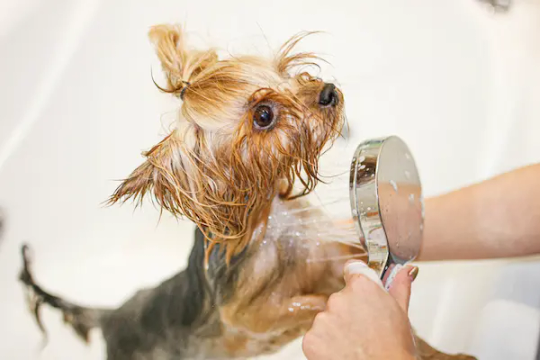
When it comes to choosing the best shampoo for Yorkies with allergies, there are a few key features to look for. Here are some things to consider before making your purchase:
Ingredients
The first thing to look for when choosing a shampoo for your Yorkie with allergies is the ingredients. Look for a product that is free from harsh chemicals such as sulfates, parabens, and artificial fragrances. Instead, opt for a shampoo that contains natural ingredients like oatmeal, aloe vera, and chamomile. These ingredients can help soothe your Yorkie's skin and reduce irritation.
Hypoallergenic
Another important feature to look for when choosing a shampoo for your Yorkie with allergies is whether it is hypoallergenic. This means that the product is less likely to cause an allergic reaction in your dog. Look for a shampoo that is specifically formulated for dogs with allergies or sensitive skin.
pH-Balanced
It's also important to choose a shampoo that is pH-balanced for your Yorkie's skin. A pH-balanced shampoo will help maintain the natural oils on your dog's skin, which can help prevent dryness and irritation. Look for a product that has a pH level between 6.0 and 7.5.
Coat Type
Finally, consider your Yorkie's coat type when choosing a shampoo. If your dog has a long, silky coat, you may want to choose a shampoo that is designed to help detangle and condition the hair. If your dog has a short, wiry coat, you may want to choose a shampoo that is designed to help clean and deodorize the skin.
By considering these factors, you can choose the best shampoo for your Yorkie with allergies and help keep your furry friend clean and comfortable.
Read the full article
0 notes
Text
Finding the Best Food for Your Yorkie with Allergies

Living with a Yorkshire Terrier who has allergies can be challenging. Food allergies are common in Yorkies, and finding the right food can be a frustrating process. This article will discuss some of the challenges of finding the right food for Yorkies with allergies and offer five different options to consider. We will also provide tips on how to choose the best food for your Yorkie.
Challenges of Finding the Right Food
One of the biggest challenges of finding the right food for a Yorkie with allergies is identifying the specific allergens that are causing the problem. Common allergens in Yorkies include beef, chicken, wheat, and soy. Once you know what your Yorkie is allergic to, you can start looking for a food that is free of those ingredients.
Another challenge is finding a food that is high in quality protein. Yorkies are small dogs, but they need a lot of protein to stay healthy. Look for a food that is made with real meat, such as chicken, lamb, or salmon, as the first ingredient. Avoid foods that are made with fillers, such as corn or wheat.
Five Food Options to Consider
Here are five different food options to consider for your Yorkie with allergies:
- Hill's Prescription Diet Chicken and Rice This food is made with chicken and rice, which are two common hypoallergenic ingredients. It is also free of gluten, wheat, and soy.
- Royal Canin Yorkshire Terrier: Hypoallergenic This food is specifically formulated for Yorkshire Terriers with allergies. It is made with hydrolyzed protein, which is a protein that has been broken down into smaller pieces to make it less likely to trigger an allergic reaction.
- Purina Pro Plan Sensitive Systems Salmon and Rice This food is made with salmon and rice, which are two less common allergens. It is also free of gluten, wheat, and soy.
- Blue Buffalo Sensitive Stomach Salmon & Sweet Potato This food is made with salmon and sweet potatoes, which are two easy-to-digest ingredients. It is also free of gluten, wheat, and soy.
- Wellness and Complete Health Turkey and Oatmeal This food is made with turkey and oatmeal, which are two gentle ingredients. It is also free of gluten, wheat, and soy.
Tips for Choosing the Best Food
When choosing a food for your Yorkie with allergies, it is important to talk to your veterinarian. They can help you identify the specific allergens that your Yorkie is allergic to and recommend a food that is right for them. It is also important to start your Yorkie on a new food slowly. This will help to prevent any digestive upset.
I hope this article has been helpful. Please remember that I am not a veterinarian, and you should always consult with your veterinarian before making any changes to your Yorkie's diet.
Read the full article
0 notes
Text
Yorkie Heat Cycle: Ages, Frequency, and Duration Explained

FactDetailsFirst Heat Cycle AgeTypically between 6 and 9 months old, with a range of 4 to 18 months possible.Frequency of Heat CyclesUsually twice a year, approximately every 6 months. Individual factors like health and nutrition can influence frequency.Duration of a Heat CycleAbout 2-3 weeks, with the most fertile period (days 9-14) in the middle.Signs of a Heat Cycle* Swollen vulva and vaginal discharge (often bloody) * Increased attraction to male dogs * More frequent urination and marking * Restlessness and clinginess * Changes in appetiteManaging Your Yorkie in Heat* Hygiene: Keep her clean to prevent infections. * Leash walks: supervise outings to avoid accidental mating. * Secure containment: Prevent escapes during fertile periods. * Consider spaying: Discuss this permanent solution with your vet.
Remember: Every Yorkie is unique, and their heat cycles may vary slightly from these averages. Consulting your veterinarian is always recommended for personalized guidance.
Understanding when your Yorkshire Terrier, commonly known as a Yorkie, goes into heat is vital for any owner, whether you're planning to breed or just ensuring the best care for your pet. A Yorkie's heat cycle is a significant part of her life and can begin anytime between five and 14 months of age. It's important not to worry if your Yorkie seems to be a late bloomer; each dog is unique, and cycles can vary even with the same breed.

Your Yorkie's first heat will signify her entry into reproductive maturity. During this time, you might notice physical and behavioral changes, such as swelling of the vulva or increased affection. Recognizing these signs can help you provide the right care and comfort.
Generally, Yorkies go into heat approximately every six months after their first cycle, although some variation is normal. Knowing what to expect and when can help you prepare for all the stages of her heat cycle, ensuring that you are providing a safe and supportive environment for her.
Key Takeaways
- Yorkies enter their first heat between five and 14 months.
- Heat cycles can be identified by physical and behavioral changes.
- Regular cycles occur about every six months following the first heat.
Understanding Yorkie Heat Cycles

When your female Yorkie reaches maturity, she will start experiencing heat cycles, which are crucial for breeding and overall health. Let's dive into what these cycles look like and how you can recognize when your Yorkie is in heat.
The Stages of a Yorkie's Heat Cycle
Proestrus: This is the start of the heat cycle where your Yorkie begins to attract male dogs. Signs include:
- Swollen vulva: It becomes more pronounced.
- Bloody discharge: A small amount of bleeding or discharge is normal.
Estrus: The actual fertile phase known as estrus follows, typically lasting around 5 to 10 days, but can vary. Here, the vulva remains swollen, and the discharge lightens in color.
Diestrus: The winding-down phase, where your Yorkie's body returns to normal even if she's not pregnant.
Anestrus: The final phase is a period of inactivity before the next cycle begins, usually lasting several months.
Recognizing Signs of Heat in Your Yorkie
You’ll notice behavioral changes such as:
- Mood swings: Your Yorkie may seem more affectionate or, conversely, more irritable.
- Appetite changes: Some Yorkies eat less during their heat cycle.
Physical signs include:
- Continued vulva swelling and changes in discharge
- The release of pheromones which attract male dogs
Keep an eye out for these cues to provide your Yorkie with extra care and attention during these times.
Age of First Heat and Frequency
Yorkies typically experience their first heat around 5 to 12 months of age, with many commencing at 10 to 12 months. After the first heat, Yorkies will come into heat roughly twice a year, though this can fluctuate. Each heat can last anywhere from 2-4 weeks, so it's important to be prepared for this biannual event.
Caring for a Yorkie in Heat

When your Yorkie first enters her heat cycle, understanding how to manage her health and comfort, as well as any breeding considerations, is crucial to ensure she remains happy and healthy.
Health and Comfort Management
Your Yorkie's health and comfort is your top priority during her heat. Expect mood swings and a change in behavior—some Yorkies may become more affectionate while others might display aggression or anxiety. Here's how to support her:
- Exercise: Maintain regular walks but keep your furry friend on a leash to avoid unwanted attention from male dogs. However, don't overdo it—she may need more rest than usual.
- Mess Management: Get ready for some spotting. Disposable diapers can save your carpets and furniture from vaginal discharge. Just make sure to change them frequently to avoid skin irritation.
- Comfort Zone: Create a cozy space with extra bedding for nesting, as she might want a private spot to rest. Sometimes, a toy or two might help keep her calm.
- Health Check-ups: Keep an eye out for any signs of health complications, and visit the vet for regular check-ups. This is also a good time to discuss the pros and cons of spaying, which can be beneficial for her long-term health.
Breeding Considerations
If you're considering breeding your Yorkie, remember that timing and health are everything:
- Fertility: Yorkshire Terriers are typically fertile for a few days during their heat cycle. Recognize when this period occurs, usually signaled by a change in vaginal discharge color from red to a straw-like hue.
- Mating: Planning for puppies means ensuring your Yorkie is in prime health. Consult your vet about pre-breeding health evaluations.
- Post-Breeding Care: After mating, monitor for signs of pregnancy and prepare for a trip to the vet to confirm. If she's pregnant, you'll need to focus on her nutrition and well-being to support her through pregnancy and the subsequent recovery.
Remember, each dog is unique, so tailor your approach to your Yorkie's individual needs, and don't hesitate to seek vet assistance if you're unsure about her health at any stage during her heat.
Read the full article
0 notes
Text
What are the Differences Between a Morkie and a Yorkie? Quick Comparison Guide

If you're a small dog lover, there's a good chance you have come across the adorable breeds known as Morkie and Yorkie. These two toy breeds often catch people's attention with their cute looks and affectionate personalities.
However, it's important to understand the differences between the two to make the best choice for your family and lifestyle.
A Morkie is a crossbreed between a Maltese and a Yorkshire Terrier, while a Yorkie, also known as Yorkshire Terrier, is a purebred dog.
Both breeds are small in size and make great companions, but there are some key differences in their appearance, temperament, and care requirements that you should be aware of before bringing one home.
Here's a quick comparison of Morkies and Yorkies
FeatureMorkieYorkieOriginsUnited StatesEnglandParent BreedsYorkshire Terrier and MalteseN/ASize6 to 8 inches tall, weighing 4 to 8 poundsSimilar to Morkie, but might varyTemperamentCharming, friendly, and sociableAffectionate, loyal, and feistyCoatSoft, silky, and wavyStraight, silky, and long
PlayYorkie & Morkie Wanting Attention
In this article, we'll explore these differences to help you make an informed decision on which breed could be the perfect fit for you.
We'll discuss their physical differences, temperament, grooming needs, and other factors to consider when deciding between a Morkie and a Yorkie as your new pet.
Origins and History
Yorkshire Terrier origins: The Yorkshire Terrier, or Yorkie, is a small breed that traces its roots back to England. They were initially bred in the 19th century for catching rodents in mills and mines.
These feisty little dogs soon gained popularity as companion pets, and today, they're one of the world's most popular dog breeds.
Maltese origins: The Maltese is another small dog breed that has been around for centuries. This ancient breed originally hails from the island of Malta, located in the Mediterranean.
They were highly regarded for their lustrous, white coat and charming, affectionate personalities. As companion dogs, Maltese gained favor amongst royalty and other high-ranking people.
Morkie origins: Unlike Yorkies and Maltese, Morkies are a relatively recent crossbreed that originated in the United States. They are a mix between a purebred Yorkshire Terrier and a Maltese.
Their cute appearance and friendly demeanor make them a popular choice for families and people looking for a small lap dog.
In conclusion, both Morkies and Yorkies have unique histories and traits that appeal to different people. The Yorkie's long-standing history in England as a rat-catcher turned companion dog makes it a favorite for many. On the other hand, the adorable mix of Maltese and Yorkshire Terrier genetics creates an irresistible appeal in the Morkie.
With this information on hand, you can better understand these breeds' backgrounds and how they contribute to their current popularity.
Description and Appearance

When comparing Morkies and Yorkies, you'll notice some similarities and differences in their coats and appearances. The Morkie is a crossbreed between a Maltese and a Yorkie, while the Yorkie is a purebred Yorkshire Terrier12.
As a small-sized toy breed, a Morkie can grow up to 6 to 8 inches tall, weighing between 4 to 8 pounds3. Their coat color varies, but it can be a combination of white, black, and brown shades3.
Usually, their fur is soft, silky, and wavy, similar to their Maltese parent. Maintaining a Morkie's coat can be somewhat challenging, as it requires regular grooming to prevent matting and tangles3.
On the other hand, Yorkies are also a small breed, standing at a similar height and weight to Morkies1. Their coat is typically straight and silky, with a steel blue and tan coloration1.
Yorkies are known for their bold appearance with a long coat that often reaches the ground1. Grooming a Yorkie can be time-consuming, but it is essential to keep them looking their best.
In terms of size, both Morkies and Yorkies are relatively small, making them suitable companions for those with limited living spaces. As they are both toy breeds, you can expect them to be similar in size and appearance, but with some distinct differences due to their parentage23.
Keep in mind that their coat colors and patterns might vary, and their grooming requirements differ as well.
Remember, when choosing between a Morkie and a Yorkie, it's essential to consider the characteristics that best suit your lifestyle and preferences.
Both breeds have their unique appearances and coat types, making them charming and adorable additions to any home.
Footnotes
- https://hellobark.com/dogs/morkie-vs-yorkie/ ↩ ↩2 ↩3 ↩4
- https://a-z-animals.com/blog/morkie-vs-yorkie-whats-the-difference/ ↩ ↩2
- https://animalso.com/breeds/morkie/ ↩ ↩2 ↩3 ↩4
Personality and Temperament
When comparing the personality and temperament of Morkies and Yorkies, you'll find both breeds share some similarities as well as differences.
Morkies are known for their affectionate and sociable nature, making them wonderful companions for singles, older couples, and seniors.
They tend to be loyal, friendly and playful, often enjoying fun interactions with their families.
Yorkies, on the other hand, exhibit a more independent and confident personality. They are quite courageous and assertive, which can be attributed to their history as working dogs.
You'll often find Yorkies to be lively and energetic, always ready to engage in activities.
Both breeds are intelligent, making them relatively easy to train. However, Yorkies are often considered more alert and might require slightly more attention during training sessions.
Consistency and positive reinforcement will yield the best results for both Morkies and Yorkies.
In terms of calmness, Morkies are generally considered to be a bit more easygoing and adaptable than Yorkies. While Yorkies are not inherently hyperactive, they tend to showcase their brave and energetic nature more often, which could be perceived as a higher energy level.
Ultimately, the personality and temperament of a Morkie or a Yorkie will depend on various factors such as their individual disposition, environmental influences, and the level of socialization they receive.
It's essential to spend time with either breed to ensure their personality aligns with your lifestyle and preferences.
Health Concerns
As a Morkie or Yorkie owner, you should be aware of the potential health issues that can affect your furry companion.
Morkies, being a crossbreed of the Maltese and Yorkshire Terrier, inherit health concerns from both their parent breeds.
Separation anxiety is common in smaller dog breeds like the Morkie and Yorkie. To alleviate this issue, try providing a comforting environment, mental stimulation and slowly increasing their time alone.
Both breeds can encounter obesity. Monitor your dog's food intake and ensure they get regular exercise to maintain a healthy weight.
Morkies and Yorkies may experience reverse sneezing. It's usually harmless but can be alarming. If it occurs frequently, consult your vet to determine if there's an underlying issue.
A collapsed trachea is a health concern that disproportionately affects small breeds. Symptoms include coughing, labored breathing, and wheezing. Prompt veterinary attention is crucial if you notice these signs.
Both breeds are prone to glaucoma and progressive retinal atrophy (PRA), which could ultimately lead to vision loss. Regular eye exams help with early detection and management.
Hypoglycemia (low blood sugar) can affect small breeds, especially Yorkies. Monitoring their diet and providing snacks can help maintain stable blood sugar levels.
Patellar luxation, a dislocation of the kneecap, can occur in both Morkies and Yorkies. Maintaining a healthy weight and providing joint supplements can assist in preventing this issue.
Morkies and Yorkies may suffer from portosystemic shunt, a liver-related health problem. If your dog exhibits symptoms like weight loss or seizures, consult your vet immediately.
Lastly, both breeds can experience hernias. While some may resolve on their own, others might require surgery. Keep an eye on any unusual bulges and get them checked by your vet.
By staying vigilant for these health concerns, you'll be better prepared to care for your Morkie or Yorkie and give them a happy, healthy life.
Care and Maintenance
Taking care of a Morkie and a Yorkie is essential to ensure they remain healthy and happy. Since both breeds share similarities, their care and maintenance needs also overlap in certain aspects.
Grooming Needs:
Morkies and Yorkies have different coat textures, but both require regular grooming. Morkies have a soft and silky coat that is more prone to matting, so it's crucial to brush them daily.
On the other hand, Yorkies have a more fine and silky coat, and they need brushing at least 2-3 times a week. It's essential to keep their coat clean and free of tangles.
Exercise and Energy Levels:
Both Morkies and Yorkies are considered high-energy dogs. They have an innate enthusiasm, making them perfect companions for daily walks or playtime.
Regular exercise is essential to keep their energy levels in check and maintain their overall well-being.
You should aim for at least 30 minutes of daily exercise, including walks and playtime. Engaging activities like fetch or agility training can help keep your energetic dog entertained and satisfied.
Training:
When it comes to training, positive reinforcement techniques work best for both Morkies and Yorkies. These breeds respond well to reward-based training, including praise, treats, and extra playtime.
Start training early to ensure they grow up to be well-behaved and obedient companions.
Remember, consistency and patience are key when it comes to training your Morkie or Yorkie. Keep sessions short and fun to maintain their interest and motivation.
In conclusion, by providing adequate grooming, exercise, and training, you can ensure the well-being of your Morkie or Yorkie companion. With the right care, these adorable dogs will bring joy and happiness to your life!
Breed Classification
When it comes to differentiating between a Morkie and a Yorkie, it's important to understand their breed classifications. Both breeds fall under the category of toy breeds, which consist of small dogs typically meant for companionship.
The Yorkshire Terrier, commonly known as a Yorkie, is a purebred dog recognized by the American Kennel Club (AKC). Yorkies belong to the toy group, as they were originally bred as lap dogs.
Today, they still serve as excellent companion dogs.
On the other hand, the Morkie is a cross between the Maltese and a Yorkie. This creates a hybrid or designer dog, which combines the best traits of both the Yorkshire Terrier and the Maltese.
Morkies are not recognized by the AKC, but they are popular among those seeking a friendly and adorable small companion.
Here's a quick comparison of Morkie and Yorkie breed classifications:
BreedClassificationToy GroupAKC RecognitionYorkshire Terrier (Yorkie)PurebredYesYesMorkieCross Breed (Maltese x Yorkie)YesNo
In summary, the key differences in breed classification between Morkies and Yorkies are that Yorkies are purebred dogs recognized by the AKC, while Morkies are popular hybrid dogs resulting from a crossbreed between a Maltese and a Yorkie. Both dogs belong to the toy breed category, making them ideal as companion dogs.
Differences between Morkie and Yorkie
Morkies and Yorkies are both adorable and popular small dog breeds, but they have some differences in their characteristics, physical appearance, and origins. Are you trying to decide which one is best for you? Let's take a look at what sets them apart.
A Morkie is a crossbreed between a Maltese and a Yorkshire Terrier (Yorkie), while a Yorkie is a purebred Yorkshire Terrier. Morkies inherit traits from both parent breeds, creating a unique blend of features, while Yorkies showcase the well-established traits specific to their breed.
When it comes to physical appearance, Morkies come in a variety of colors due to their mixed heritage, such as white, black, and shades of tan. Yorkies typically have a steel blue and tan coat, although some variation can occur. Size-wise, Morkies usually stand around 6 to 8 inches tall and weigh 4 to 8 pounds, while Yorkies stand slightly taller at 7 to 9 inches and weigh about 4 to 7 pounds.
When considering temperament, both Morkies and Yorkies are affectionate, loyal, and energetic. However, their specific personalities can differ. Morkies may be more mischievous around strangers than Yorkies. Of course, every dog is an individual and unique. It is essential to spend time with a potential pet to gauge its personality and suitability for your lifestyle.
Pros and Cons: Morkie Vs. Yorkie
MorkieYorkiePros- More variety in colors
- Unique mix of traits
- Affectionate and loyal- Well-established breed traits
- Affectionate, loyal, and feisty
- Slightly taller and lighterCons- Smaller gene pool
- Mischievous around strangers- Limited coat colors
- Prevalence of some genetic health issues
In summary, the main differences between Morkies and Yorkies lie in their origins, physical appearance, and certain aspects of their temperament. While neither breed is inherently better than the other, understanding their characteristics can help you decide which breed might be a better fit for your home and lifestyle.
Potential Challenges and Solutions
Separation Anxiety: Both Morkies and Yorkies can suffer from separation anxiety if left alone for long periods. To help ease this, provide them with a comforting environment and gradually increase the time spent away from them. Consistent training and providing mental stimulation toys can also help reduce their anxiety.
Hypoglycemia: These small breeds are prone to hypoglycemia, a condition where blood sugar levels drop dangerously low. To prevent this, ensure they have regular meals and monitor their weight. If you notice any signs of weakness or disorientation, consult your vet immediately.
Collapsed Trachea: Both breeds have a predisposition to collapsed trachea, a condition affecting their airways.
Read the full article
0 notes
Text
Are Yorkies Good With Other Dogs? A Comprehensive Guide
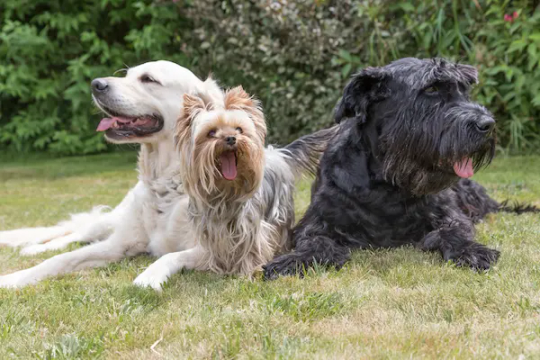
Are Yorkies Good With Other Dogs?
Yorkshire Terriers, or Yorkies, are known for their small size, adorable looks, and lively personalities. They are a popular breed of toy dogs and have been around for over a century. One of the most common questions that potential Yorkie owners ask is whether these dogs get along with other dogs. In this article, we will explore this question and provide some insights into Yorkies' social behavior.
Understanding Yorkies
Before we delve into the topic of Yorkies' social behavior, it's essential to understand their breed characteristics. Yorkies are known for their feisty and confident personalities. They are intelligent, curious, and energetic dogs that love to play and explore. However, their small size can make them vulnerable to bigger dogs, and they may become aggressive or defensive in such situations. Therefore, it's crucial to socialize them properly and train them to behave appropriately around other dogs.
Yorkies and Other Dogs
Yorkies can get along with other dogs, but it depends on various factors such as their personality, socialization, and training. Some Yorkies may be more friendly and outgoing than others, while some may be more reserved or territorial. Additionally, their behavior towards other dogs may change depending on the situation, such as meeting a new dog, playing with a familiar dog, or encountering a strange dog on a walk. Therefore, it's essential to monitor their behavior and intervene if necessary to prevent any conflicts or injuries.
Key Takeaways
- Yorkies can get along with other dogs, but it depends on various factors such as their personality, socialization, and training.
- Proper socialization and training are crucial to help Yorkies behave appropriately around other dogs.
- It's essential to monitor their behavior and intervene if necessary to prevent any conflicts or injuries.
Understanding Yorkies
PlayYORKSHIRE TERRIER WITH OTHER CHILDREN AND PETS
As a toy breed, Yorkies are small in size but have big personalities. They are known for their brave and loyal nature and are often described as affectionate and playful. Yorkies have a lot of energy and require regular exercise to keep them healthy and happy.
When it comes to temperament, Yorkies can be bossy and stubborn at times. They are known for their independent streak and may not always listen to commands. However, with proper training and socialization, Yorkies can be well-behaved and obedient pets.
Yorkies are a popular breed and are known for their distinctive appearance. They have long, silky hair that requires regular grooming to keep it looking its best. Yorkies come in a variety of colors, including black, tan, and white.
In summary, Yorkies are a unique combination of terrier and toy breed, with a personality that is both brave and affectionate. They are known for their energy and can be stubborn at times, but with proper training and socialization, they can make great pets.
Yorkies with Other Dogs
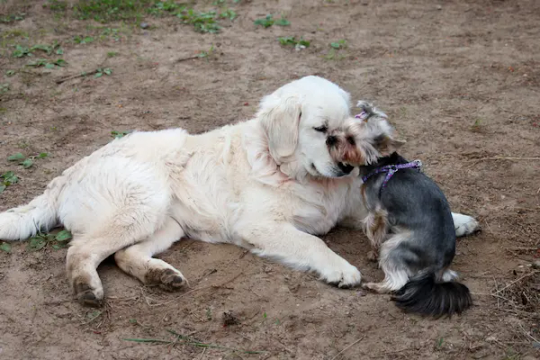
As a breed, Yorkies are generally good with other dogs. They are social creatures and enjoy the company of other canine companions. However, like with any breed, there are certain factors to consider when introducing Yorkies to other dogs.
Compatibility is key when it comes to Yorkies and other dogs. While Yorkies can get along with dogs of all breeds and sizes, some breeds may make better playmates than others. For example, Golden Retrievers and Labrador Retrievers are known for their friendly and outgoing personalities, making them great companions for Yorkies. On the other hand, Great Danes may be too large and intimidating for Yorkies, while Chihuahuas may be too small and fragile.
When introducing Yorkies to other dogs, it is important to do so in a neutral location. This helps to prevent territorial behavior and allows the dogs to interact without any distractions. It is also important to supervise their interactions and separate them if necessary.
If you already have another dog in the household and are considering adding a Yorkie to the mix, it is important to introduce them slowly and carefully. It may be best to start by keeping them separated and gradually allowing them to spend more time together. It is also important to give each dog their own space and attention, to prevent any jealousy or competition.
In summary, Yorkies can make great canine companions for other dogs, but it is important to consider compatibility and introduce them carefully. With proper supervision and attention, Yorkies can form strong relationships and have positive interactions with other dogs.
Factors Affecting Yorkie's Social Behavior
When it comes to the social behavior of Yorkies, there are several factors that can affect their interactions with other dogs. These factors include age, gender, personality, energy level, environment, health, fear, anxiety, dominance, possessiveness, and territorial behavior.
Age
Age is an important factor to consider when introducing Yorkies to other dogs. Puppies are generally more social and curious, and they tend to be more accepting of other dogs. Older dogs, on the other hand, may be less tolerant of other dogs, especially if they have not been socialized properly.
Gender
Gender can also play a role in a Yorkie's social behavior. Female Yorkies may be more territorial and aggressive towards other females, while male Yorkies may be more territorial and protective of their space. However, this is not always the case, and each Yorkie is unique in their personality and temperament.
Personality and Energy Level
A Yorkie's personality and energy level can also affect their social behavior. Some Yorkies are more outgoing and friendly, while others are more reserved and shy. Additionally, Yorkies with high energy levels may be more prone to playful behavior with other dogs.
Environment and Health
The environment and health of a Yorkie can also impact their social behavior. Yorkies that have been poorly socialized or have had negative experiences with other dogs may exhibit fear, anxiety, or defensive behaviors towards other dogs. Additionally, Yorkies with health issues may be less tolerant of other dogs.
Dominance, Possessiveness, and Territorial Behavior
Dominance, possessiveness, and territorial behavior are also factors that can affect a Yorkie's social behavior. Yorkies that exhibit these behaviors may be more prone to aggression towards other dogs, especially if they perceive them as a threat to their territory or possessions.
Overall, it is important to consider these factors when introducing Yorkies to other dogs. Proper socialization, training, and supervision can help ensure that Yorkies have positive interactions with other dogs and can coexist peacefully.
Socialization and Training
Socialization and training are essential for Yorkies to get along with other dogs. Early socialization is especially important for puppies to learn how to interact with other dogs and humans. Positive reinforcement and consistency are key factors in obedience training.
When socializing a Yorkie, it's important to introduce them to other dogs gradually and in a controlled environment. We can start by introducing them to calm and friendly dogs, and gradually move on to more challenging situations. It's important to supervise the interactions and provide positive reinforcement for good behavior.
Obedience training is also important for Yorkies to learn basic commands such as "sit," "stay," and "come." This training can help establish boundaries and prevent aggressive behavior towards other dogs.
We can also provide mental stimulation for our Yorkies through interactive toys and games. This can help prevent boredom and reduce the likelihood of destructive behavior towards other dogs.
In summary, socialization and training are crucial for Yorkies to get along with other dogs. Early socialization, positive reinforcement, consistency, and obedience training are all important factors to consider. By providing our Yorkies with the proper socialization and training, we can help them coexist peacefully with other dogs.
Yorkies in a Household Setting
When it comes to Yorkies living with other dogs in a household setting, it's important to consider a few things to ensure their safety and happiness. Yorkies are known for their vibrant personalities and big hearts, but they can also be possessive of their homes, toys, and food. Therefore, it's essential to supervise their interactions with other dogs, especially during meal times and playtime.
If you have other pets, such as cats, in the household, it's important to introduce them to your Yorkie gradually and under close supervision. Yorkies can get along with cats, but it depends on their individual temperament and the way introductions are managed. It's important to give your pets time to get used to each other and establish a positive relationship.
Yorkies can also get along with children, but it's important to teach children how to interact with them properly. Yorkies are small dogs and can be easily injured if handled roughly. Therefore, it's important to supervise children when they're playing with Yorkies and teach them to be gentle and respectful.
If you have a working dog in the household, such as a service dog, it's important to supervise their interactions with your Yorkie. Yorkies are playful and energetic, but they can also be bossy and dominant, which can lead to conflicts with other dogs. Therefore, it's important to establish clear boundaries and rules for your pets and supervise their interactions to prevent any conflicts.
In summary, Yorkies can get along with other dogs, cats, and children, but it's important to supervise their interactions and establish clear boundaries and rules. By doing so, you can ensure that your pets live in a harmonious and happy household.
Maintaining a Healthy Yorkie
As Yorkies are small dogs, they tend to have a longer lifespan compared to larger breeds. However, they are also prone to certain health issues such as dental problems, hypoglycemia, and tracheal collapse. Therefore, it is essential to take good care of your Yorkie to ensure they stay healthy and happy.
Health
Regular visits to the vet are crucial for maintaining your Yorkie's health. We recommend scheduling annual check-ups and vaccinations to prevent any potential health problems. Additionally, it is essential to keep an eye out for any signs of illness or discomfort and address them promptly.
Exercise
While Yorkies are small, they are still energetic dogs that require regular exercise. Daily walks and playtime can help keep your Yorkie healthy and happy. However, it is important to note that Yorkies are prone to overheating, so we recommend avoiding exercise during the hottest parts of the day and providing plenty of water.
Grooming
Yorkies have a long, silky coat that requires regular grooming to prevent matting and tangling. We recommend brushing your Yorkie's coat daily and taking them to a professional groomer every six to eight weeks. Additionally, it is important to keep your Yorkie's ears clean and dry to prevent infections.
Breeders
When looking for a Yorkie, it is important to find a reputable breeder who prioritizes the health and well-being of their dogs. A good breeder will provide you with health certificates and pedigree information and allow you to meet the puppy's parents.
Healthy
Feeding your Yorkie a healthy diet is essential for their overall health and well-being. We recommend feeding your Yorkie a high-quality dog food that is specifically formulated for small breeds. Additionally, it is important to avoid overfeeding your Yorkie, as they are prone to obesity.
In conclusion, maintaining a healthy Yorkie requires regular vet visits, exercise, grooming, finding a reputable breeder, and feeding them a healthy diet. By following these guidelines, you can help ensure your Yorkie lives a long, healthy, and happy life.
Conclusion
In conclusion, Yorkies can get along with other dogs, but it depends on several factors. While Yorkies have a friendly and affectionate personality, they can also be territorial and protective of their space and their humans. This can sometimes lead to conflicts, particularly if they encounter dominant breeds or individuals.
Introducing Yorkies to other dogs requires careful supervision and patience. It is important to introduce them slowly and in a neutral location, such as a park or a friend's backyard. It is also essential to watch their behavior closely and intervene if necessary.
When it comes to behavior, Yorkies are known for their spunky and lively nature. They are not submissive or easily dominated by other dogs, which can sometimes lead to conflicts. However, with proper training and socialization, Yorkies can learn to coexist peacefully with other dogs.
Overall, Yorkies can be great companions for those looking for a small, affectionate pet. While they may have some territorial instincts and can be protective of their space, they can also be friendly and playful with other dogs. It is important to understand their personality and behavior and to introduce them to other dogs carefully and patiently.
Read the full article
0 notes
Text
What Should You Name Your Yorkie? Top Ideas and Tips
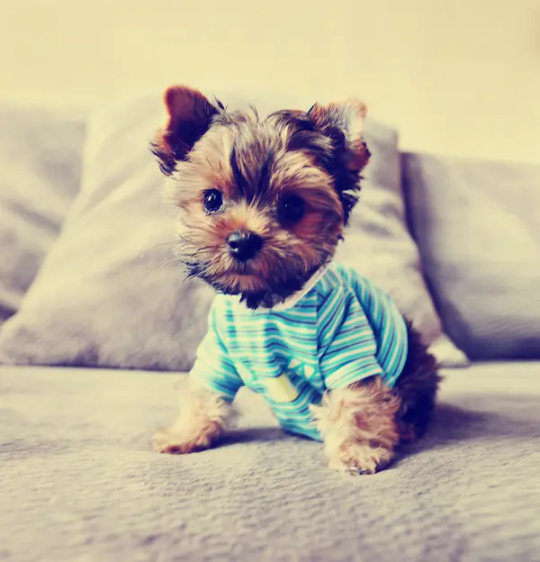
Naming your Yorkie is an exciting and important task as it helps to define their personality and create a connection between you and your furry companion. With their cute size and playful nature, these tiny terriers deserve a name that reflects their unique charm. In this article, we will explore some tips and ideas to help you choose the perfect name for your Yorkie.
When selecting a name for your Yorkshire Terrier, consider factors such as their appearance, temperament, and any special qualities they possess. Also, take into account your own interests and preferences. After all, you and your Yorkie will be sharing many happy moments together, and their name should evoke positive feelings for both of you.
Celebrity and famous Yorkies can also serve as inspiration, as many of these dogs have equally adorable and memorable names. So, let's dive into the world of Yorkie names and discover the perfect moniker for your precious pup.
Key Takeaways
- Choosing a Yorkie name involves considering your dog's appearance, personality, and your own interests
- Yorkies can be named after celebrities or famous Yorkshire Terriers for inspiration
- A well-chosen name can strengthen the bond between you and your Yorkie
Choosing a Name for Your Yorkie

Use the Yorkie Name Generator
When selecting a name for your Yorkshire Terrier, it is essential to consider your dog's personality, popularity, and uniqueness. Your Yorkie's name should reflect their individuality and charm and be easy to pronounce and recall. This guide will help you find the perfect name for your furry friend with three main approaches to naming your pet.
Personality-Based Names
Yorkies are known for their big personalities in small packages. As you observe your Yorkie puppy, you may notice certain traits, such as being feisty, affectionate, or even goofy. By choosing a name based on your dog's personality, you'll have a constant reminder of their unique character. For example, a high-energy Yorkie might be named "Sparky," while a cuddly, affectionate one could be "Snuggles."
Popularity-Based Names
Another way to choose a Yorkie name is by considering popular and well-liked names for this breed. Some popular male Yorkie names include Max, Buddy, and Bear, while popular female Yorkie names are Bella, Daisy, and Lucy. While following popular trends may make your choice easier, remember that there will be many other dogs with the same name. If you want your Yorkie to stand out, you might want to explore less common options.
Unique and Uncommon Names
For those who desire a one-of-a-kind name for their Yorkie, unique and uncommon names are the way to go. These names can be inspired by anything that interests you, from your favorite books or movies to historical figures or even just a creative idea. Remember to keep your Yorkie's name to one or two syllables, as this will make it easier for your dog to learn and respond to their name.
Male Yorkshire TerriersFemale Yorkshire TerriersMaxBellaCharlieDaisyBuddyLucyCooperMollyRockySadieTeddyLolaOliverRosieJackLilyTobyChloeDukeSophieLouieMaggieBentleyRubyGizmoCocoMurphyAbbyOscarGracieWinstonZoeySimbaMiaRustyPennySammyLulu
The key to choosing the perfect Yorkie name is finding one that resonates with you and your dog's character. Whether it's based on their bubbly personality, popular names among small dogs, or a truly unique and original idea, make sure your choice brings joy to you and your furry family member.
Celebrity and Famous Yorkie Names
TV and Movie Inspired Names
If you're a fan of TV shows and movies, there are some iconic Yorkie names to choose from. For instance, Boi from the High School Musical series is a cute option, especially if you love Sharpay Evans' fluffy companion. Another fun choice would be Hootie, a little Yorkie in the movie Urban Legend who enjoyed drinking beer. Mignon was a charming Yorkshire Terrier in the classic TV show Green Acres. Be sure to explore other TV and Movie Inspired Names when naming your Yorkie.

Names of Famous Yorkies
Many Yorkies have left their pawprints in various areas of pop culture. The American Kennel Club recognizes this popular dog breed's importance, with several famous Yorkies on their lists. Notably, two legendary Yorkies, Samson and Rupert, played crucial roles in England's history, like working as exterminators in coal mines and factories during the Industrial Revolution.
One unforgettable Yorkie named Smoky was a war hero in World War II who even helped the soldiers in the telecommunications department. Considering the small size of a Teacup Yorkie, it's pretty bold to name your little pal after the fearless warrior Chewbacca from Star Wars. Enjoy the process of naming your Yorkie after famous Yorkies from history, pop culture, and beyond.
Remember to keep it friendly, make your paragraphs short, and use second-person language while writing and exploring these names. Your lovable Yorkie deserves a memorable name that reflects their unique personality!
Read the full article
0 notes
Text
Unleashing Yorkie Power: How Many Puppies Can a Yorkie Have?
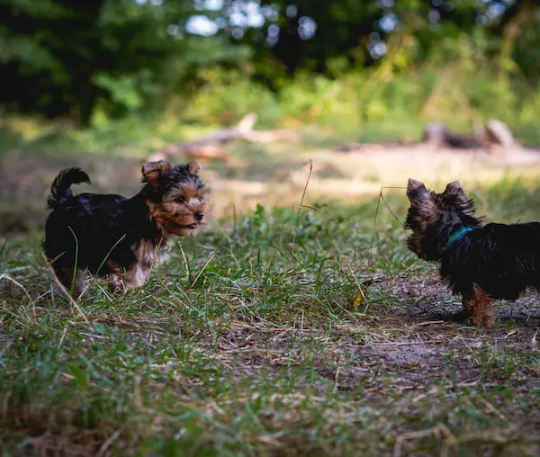
Yorkshire Terriers, commonly known as Yorkies, are an adorable small breed of dog that is popular among pet owners. One of the most common questions asked by Yorkie owners or breeders is how many puppies can a Yorkie have. The answer to this question depends on various factors such as the size, age, and health of the Yorkie.
Understanding Yorkies is essential before discussing their pregnancy and breeding. Yorkies are a small breed of dog that typically weigh between 4 and 7 pounds and stand around 7 to 8 inches tall at the shoulder. They are known for their long, silky coat, which requires regular grooming. Yorkies are friendly, energetic, and loyal dogs that make great companions for individuals or families. They are also known for their ability to adapt to apartment living due to their small size.
https://www.youtube.com/watch?v=1eA8Wzijrwc&embed=true
Key Takeaways
- Yorkies are a small breed of dog known for their friendly, energetic, and loyal nature.
- The number of puppies a Yorkie can have depends on various factors such as size, age, and health.
- Yorkie litters typically range from 1 to 5 puppies, with larger litters being less common.
Understanding Yorkies
Yorkshire Terriers, commonly known as Yorkies, are a popular toy breed that originated in Yorkshire, England. They are small dogs that typically weigh between 4 to 7 pounds and stand 8 to 9 inches tall at the shoulder. Yorkies have a long, silky coat that comes in a variety of colors, including black, tan, and blue.
The breed standard for Yorkies, as set by the American Kennel Club, describes them as confident, courageous, and self-assured. They are also known for their high energy levels, intelligence, and loyalty to their owners. Yorkies make excellent companion dogs and are suitable for apartment living, as they do not require a lot of space to exercise.
When it comes to breeding, Yorkies have a relatively small litter size, typically ranging from one to five puppies. Several factors can affect the size of a Yorkie litter, including the age and health of the mother, genetics, and nutrition. It is important to note that Yorkies may be at higher risk for pregnancy complications, such as hypoglycemia and cesarean delivery, due to their small size.
Overall, Yorkies are a beloved breed of small dogs known for their spunky personalities and affectionate nature. Whether you are considering adding a Yorkie to your family or simply want to learn more about this breed, understanding their characteristics and breeding habits is essential.
Yorkie Pregnancy Basics
Yorkie pregnancy is an exciting time for dog owners, but it can also be a bit daunting. It is important to ensure that the female Yorkie is healthy and well taken care of during this time. A pregnant Yorkie requires special care and attention from the owner and veterinarian.
The gestation period for a Yorkie is approximately 63 days, but it can vary by a few days. During the first few weeks of pregnancy, there may not be any noticeable signs of pregnancy. However, as the pregnancy progresses, there are several signs that owners can look out for. These include lethargy, decreased appetite, and swollen nipples.
It is important to take the pregnant Yorkie to a veterinarian for regular checkups to ensure that she is healthy and the pregnancy is progressing as expected. A veterinarian can also provide guidance on proper nutrition and exercise during this time.
Female Yorkies become sexually mature at around 6-8 months of age. However, it is recommended to wait until they are at least 1 year old before breeding. Breeding a Yorkie too early can lead to health problems for the mother and the puppies.
The number of puppies a Yorkie can have varies depending on several factors such as the size, age, and experience of the mother. Generally, Yorkie moms have from 2 to 5 puppies, but some may have more. Larger or more experienced mothers tend to have more puppies than smaller or inexperienced ones.
In conclusion, Yorkie pregnancy is an exciting time for dog owners, but it requires proper care and attention to ensure the health of the mother and the puppies. Owners should take their pregnant Yorkies to a veterinarian for regular checkups and provide proper nutrition and exercise.
Breeding Yorkies
Breeding Yorkies can be a rewarding experience, but it requires careful planning and preparation. Before breeding, it is important to ensure that both the male and female dogs are healthy and free of any genetic disorders. Breeders should also consider the ethical implications of breeding and ensure that they are not contributing to overbreeding or the mistreatment of animals.
Mating
Mating between a male and female Yorkie typically occurs naturally. The female will go into heat approximately twice a year, and the male will be attracted to her scent. Breeders should allow the dogs to mate naturally, but should also monitor the process to ensure that it is successful.
Delivery
Yorkies typically have small litters, with an average of 2 to 5 puppies per litter. The delivery process can be difficult for some dogs, especially if they are small or have health issues. Breeders should ensure that the dam is in good health and provide her with a comfortable and safe environment for delivery. If there are any complications during delivery, it is important to seek veterinary assistance immediately.
Breeding Process
Breeding Yorkies involves a careful and thorough process. Before breeding, breeders should ensure that both the male and female dogs are healthy and free of any genetic disorders. They should also consider the ethical implications of breeding and ensure that they are not contributing to overbreeding or the mistreatment of animals.
Artificial Insemination
In some cases, breeders may choose to use artificial insemination to breed their Yorkies. This process involves collecting semen from the male dog and using it to fertilize the female's eggs. Breeders should work with a veterinarian who is experienced in artificial insemination to ensure that the process is successful.
Breeders
When choosing a breeder, it is important to do research and find a reputable breeder who is committed to the health and well-being of their dogs. Ethical breeders will be happy to answer any questions and provide information about their breeding practices.
Male Dog (Sire)
The male dog, or sire, plays an important role in breeding Yorkies. Breeders should choose a healthy and genetically sound male dog who is compatible with the female. The male should also be tested for any genetic disorders to ensure that they are not passed on to the offspring.
Female Dog (Dam)
The female dog, or dam, also plays a crucial role in breeding Yorkies. Breeders should choose a healthy and genetically sound female dog who is compatible with the male. The female should also be monitored closely during pregnancy and provided with a safe and comfortable environment for delivery.
Yorkie Litter Size

Yorkshire Terriers, also known as Yorkies, are a small breed of dogs that are known for their charming personalities. One of the most common questions that Yorkie breeders and owners have is about the size of their litter.
The average litter size for a Yorkie is 3-5 puppies per litter, according to Friendly Yorkie Pups. However, this can range from 1-8 puppies depending on various factors such as the environment and maternal health status. It is important to note that exceptional litters sometimes exceed 10 puppies total, although this is less common.
The size of a Yorkie's litter can be influenced by several factors, including the size and age of the parents, as well as the number of previous pregnancies. According to Animal Wised, a normal litter size for a healthy Yorkie typically ranges from 1 to 5 puppies.
It is also important to note that a Yorkie's first litter may be smaller than subsequent litters. This is because a first-time mother may not have fully developed her reproductive system. However, the size of a Yorkie's previous litter is not necessarily an indication of the size of future litters.
Overall, while the average litter size for a Yorkie is 3-5 puppies, it can vary depending on several factors. Breeders and owners should be prepared for the possibility of both small and large litters and should ensure that the mother is healthy and well-cared for during pregnancy and delivery.
Health Risks and Complications
Breeding Yorkies comes with risks and complications. There are several factors that can impact the health of the mother and the puppies during pregnancy and delivery. Being aware of these risks can help breeders take the necessary precautions and minimize the chances of complications.
Risk Factors
One of the biggest risk factors for Yorkies is their small size. Due to their petite frame, they may experience difficulties during pregnancy and delivery. The puppies may also be at risk of physical defects and stillborn births. Inexperienced mothers may also have trouble nursing and caring for their puppies.
Health Complications
Yorkies are prone to several health complications that can affect their ability to reproduce. Osteoarthritis and hip dysplasia are two of the most common diseases in Yorkies, and they can be passed on to puppies. These conditions can make it difficult for the mother to carry and deliver the puppies.
Delivery Problems
Yorkies may experience delivery problems due to the size of the puppies in relation to the mother's size. This can lead to dystocia, which is difficulty giving birth. It is important to be prepared for the possibility of complications or variations during delivery.
Conclusion
Breeding Yorkies comes with risks and complications that can impact the health of the mother and the puppies. It is important to be aware of these risks and take the necessary precautions to minimize them. By doing so, breeders can help ensure the health and well-being of their dogs and their puppies.
Yorkie Puppy Care
Taking care of a Yorkie puppy can be a rewarding experience, but it also requires a lot of attention, care, and responsibility. Here are some tips to ensure your Yorkie puppy stays healthy and happy:
Training
Yorkie puppies are intelligent and can be trained easily. Start training your puppy early to establish good behavior and prevent bad habits. Use positive reinforcement techniques such as treats and praise to encourage good behavior.
Grooming
Yorkie puppies have long, silky hair that requires regular grooming. Brush their hair daily to prevent tangles and mats. Bathe your puppy every three to four weeks using a mild dog shampoo. Trim their nails regularly to prevent discomfort and injury.
Food and Nutrition
Yorkie puppies require a balanced diet to support their growth and development. Feed your puppy high-quality dog food that is appropriate for their age and size. Avoid feeding them table scraps or human food, as it can cause digestive problems and weight gain.
Veterinary Check-ups
Regular veterinary check-ups are essential to ensure your Yorkie puppy stays healthy. Take your puppy to the vet for routine check-ups, vaccinations, and preventative care. If you notice any signs of illness or discomfort, contact your vet immediately.
By following these tips, you can provide your Yorkie puppy with the care and attention they need to thrive. Remember that owning a puppy is a long-term commitment and requires patience, dedication, and love.
Special Yorkie Breeds
Yorkshire Terriers are a popular dog breed known for their small size and affectionate nature. However, there are several special Yorkie breeds that are worth mentioning.
Teacup Yorkies
Teacup Yorkies are a smaller version of the already small Yorkie breed. They typically weigh between 2 and 4 pounds and stand no more than 6 inches tall. Due to their small size, they require extra care and attention to ensure their health and safety.
Yorkiepoo
The Yorkiepoo is a crossbreed between a Yorkshire Terrier and a Poodle. They are known for their hypoallergenic coat and friendly personality. Yorkiepoos are also highly intelligent and easy to train.
Morkie
The Morkie is a crossbreed between a Yorkshire Terrier and a Maltese. They are known for their playful and affectionate nature, making them great family pets. Morkies are also easy to train and require minimal grooming.
Pekingese Yorkie Mix
The Pekingese Yorkie Mix is a crossbreed between a Yorkshire Terrier and a Pekingese. They are known for their long, silky coat and affectionate personality. Pekingese Yorkie Mixes are also highly adaptable and make great apartment dogs.
Overall, these special Yorkie breeds offer unique characteristics and traits that make them stand out from the standard Yorkshire Terrier. It's important to research and understand the specific needs and requirements of each breed before bringing one into your home.
Conclusion
In conclusion, Yorkies are known for their affectionate nature and make great companions for families. Male Yorkies can also be great for breeding, but it is important to understand how many puppies they can have in a litter. While the average litter size for a Yorkie is between 2 and 5, some may have up to 8 or 9 puppies, but this is very rare DailyDogDrama.
Several factors can affect how many puppies a Yorkie will have, including age, health, and genetics YYorkie. Young dogs under the age of 1.5 years typically have few puppies (1-2 puppies in dogs of small breeds and no more than 4 in large ones), while dogs older than 5 to 6 years usually have fewer puppies in the litter Yorkie Guide.
It is important to note that the number of puppies in a litter is subject to change and can range from one to five Terrier Hub. When a family has more than five pups, there is a greater possibility that some puppies will be born dead or die soon after birth.
Overall, breeding Yorkies requires careful consideration and responsible ownership. It is important to consult with a veterinarian and understand the potential risks and responsibilities that come with breeding. With proper care and attention, Yorkies can bring joy and affection to their owners.
Read the full article
1 note
·
View note
Text
Bringing Home a Yorkshire Terrier Puppy: Essential Tips for a Smooth Transition

Bringing home a Yorkshire Terrier puppy is an exciting milestone for a dog lover. Yorkies are known for their loving and spirited personalities, making them perfect companions for individuals or families. Before embarking on this journey, it's important to gather crucial information about this breed to ensure a successful and smooth introduction to their new home.
When welcoming a Yorkie puppy, it's crucial to consider multiple aspects of their well-being, like housing requirements, training needs, and their specific health concerns. Adequate preparation will help you provide the best care possible and nurture a strong bond between you and your new companion.
With the right planning and dedication, your Yorkie puppy will become an integral part of your life, bringing joy and companionship to you and your family. Keep in mind the importance of educating yourself before the puppy's arrival, ensuring a safe and comfortable environment, and staying committed to their care, training, and socialization.
PlayYorkie puppies playing
Key Takeaways
- Properly preparing for a Yorkie puppy's arrival ensures a smooth transition into your home.
- Providing consistent care and meeting your puppy's unique needs throughout their life will lead to a strong bond.
- Prioritizing health, training, and socialization sets your Yorkie puppy up for success and happiness in their new home.
Why Choose a Yorkshire Terrier
Yorkshire Terriers, often referred to as Yorkies, are a popular breed for many reasons. One of the main reasons is their small size, which makes them suitable for a variety of living situations. They are often less than seven pounds but possess a sturdiness that ensures they don't come across as being too dainty 1.
Yorkies are also known for their high energy and lively personalities 2. They are friendly, affectionate, and eager to please their owners. This makes them excellent companions and fun pets to have around.
Below are some key features of Yorkshire Terriers to help you understand why they might be the perfect choice for you:
Size: Small (less than 7 pounds)
Energy Level: High
Temperament: Friendly and Affectionate
Grooming Needs: Moderate (regular brushing required)
Adaptability: Good (suitable for apartments or houses)
Another advantage of choosing a Yorkie is their adaptability to different environments. Whether you live in an apartment or a house with a yard, a Yorkie can thrive as long as they receive proper care, exercise, and attention 3.
So, if you're looking for a small, lively, and affectionate companion, a Yorkshire Terrier may be the ideal pet for your family.
Considerations Before Bringing Home a Puppy
Household Evaluation
Before bringing a Yorkshire Terrier puppy home, it's essential to evaluate your household and ensure it's a suitable environment for the puppy to thrive. Consider the following points:
- Space: Ensure you have enough space for the puppy to run, play, and explore.
- Safety: Make sure your home is puppy-proof by eliminating any hazards they might encounter.
- Other pets: If you have other pets, consider how they will interact with a new addition to the family.
- Family members: Teach children how to safely handle the puppy and set rules for behavior around the new pet.
By carefully evaluating your household, you can create a welcoming and safe environment for a Yorkshire Terrier puppy.
Financial Aspects
Owning a Yorkshire Terrier puppy involves financial responsibilities. Keep the following expenses in mind:
ExpenseDescriptionPuppy foodYorkies require high-quality food tailored to their size and age.GroomingRegular grooming is essential to maintain their coat and overall health.VeterinaryRoutine check-ups, vaccinations, and unforeseen health expenses.SuppliesCollars, leashes, toys, bedding, crate, and more.
Apart from these primary expenses, be prepared to cover additional costs such as training, boarding, or daycare services if needed. Carefully assessing your financial situation before bringing home a puppy ensures that you can provide your new companion with the best care possible. Remember, Yorkies are small but feisty and energetic—you'll want to make sure you can provide for their needs while enjoying their delightful company.
Finding a Reputable Breeder
When you decide to bring home a Yorkshire Terrier puppy, the first step is to find a reputable breeder. It's crucial to ensure you bring home a healthy and well-socialized companion. In this section, we will guide you through the process of choosing the right breeder.
Start by doing thorough research on Yorkshire Terrier breeders. Look for breeders who prioritize the health and welfare of their dogs, adhere to responsible breeding practices, and strive to produce high-quality Yorkies.
Here are a few factors to consider while evaluating breeders:
- Health Testing: Ensure the breeder conducts necessary health tests on their Yorkies and provides documentation as proof.
- Breeding Philosophy: A reputable breeder will have a clear breeding philosophy that emphasizes the well-being of the breed.
- Home Environment: Visit the breeder's place and observe the living conditions of the dogs. A clean and organized environment is a good indicator.
To help you narrow down your search, here is a list of recommended breeders from Bubbly Pet:
- Artistry Yorkies - Michigan
- Velvet Touch Yorkies - Texas
- Yorkies by Diane - Utah
- Benntley Yorkies - Washington
- Teacup & Toy Pets Boutique - Texas
Additionally, learn about the red flags to look for when researching breeders. Avoid puppy mills and puppy scammers.
Discuss the Yorkshire Terrier's temperament, exercise, and grooming needs with the breeder. Make sure you're prepared to provide the necessary care for your Yorkie.
By following these guidelines, you'll be well on your way to finding a reputable breeder and bringing home a happy, healthy Yorkshire Terrier puppy. Good luck with your search!
Preparing Your Home
Puppy-Proofing
Before bringing home your Yorkshire Terrier puppy, it is essential to puppy-proof your home. This involves eliminating potential hazards and ensuring a safe environment for your new four-legged friend.
- Hide electrical cords and wires: Keep wires secured and out of reach, so your Yorkie doesn't chew on them.
- Secure cabinets and doors: Use childproof locks to prevent access to cleaning products and other potentially dangerous items.
- Remove hazardous objects: Ensure small items, toxic plants, and choking hazards are out of your puppy's reach.
- Limit access to stairs: Install baby gates to prevent accidental tumbles down the stairs.
Creating a Comfortable Space
A comfortable space is vital for your Yorkshire Terrier puppy's well-being and happiness. Make sure to prepare an area with the necessary items your Yorkie will need to feel at home.
- Crate/Cage: Invest in a comfy crate or cage for your puppy to sleep in and feel safe.
- Food and water dishes: Buy quality dishes for your puppy's meals and always keep fresh water available.
- Toys and activities: Provide a variety of safe and engaging – chew toys, puzzle toys, and soft toys to keep your puppy entertained.
- Bedding: Get a comfortable and cozy bed specifically designed for Yorkie puppies to ensure a good night's sleep.
Remember, consistency in your Yorkie's environment will help them to settle in quickly and comfortably. Be prepared to give your new furry friend lots of love and attention, and they will soon feel right at home.
First Day Home
When you bring your Yorkshire Terrier puppy home, it's essential to make your furry friend feel comfortable and safe. Start by preparing a designated area for your Yorkie, complete with a crate, blankets, toys, food, and water dishes.
On their first day, keep the environment as calm as possible so your puppy can get accustomed to their new surroundings. Introduce your Yorkie to their crate to establish a sense of security, and place their food and water dishes nearby. For the first meal, make sure to use quality puppy food to support their growth and health.
Allow your Yorkie to explore their new environment, but be cautious about overwhelming them with too many new experiences. Take the time to observe your puppy's body language for signs of stress or excitement. Remember, it's crucial to remain patient as your dog learns the ropes of their new home.
During the first day, it's essential to establish routines and boundaries. Begin working on a potty training schedule as soon as possible to avoid confusion. Consistency is vital, so make sure family members are on the same page regarding house rules and puppy training commands. Additionally, ensure that children understand how to interact safely with the puppy.
DoDon'tBe patientOverwhelm the puppyEstablish routinesIgnore stressed body languageUse quality puppy foodOvercrowd the space
Finally, playtime is essential for your puppy's development. However, limit the play sessions to around 15 minutes, allowing enough time for your Yorkie to rest in between. Incorporating playtime will help create a strong bond between you and your pet, promoting a loving and long-lasting relationship.
Feeding Your Yorkshire Terrier Puppy
When bringing home a Yorkshire Terrier puppy, it's essential to ensure proper nutrition. Getting the right balance of nutrients will help your puppy grow healthy and strong. Here's a simple guide on feeding your Yorkshire Terrier puppy.
To start with, it's important to monitor your puppy's daily caloric intake. An adult Yorkshire Terrier weighing about 8 lbs. should consume around 293 calories a day. However, puppies have different nutritional needs, so consult with your veterinarian to determine the appropriate amount for your Yorkie puppy.
Choose high-quality commercial puppy food specifically designed for small dog breeds. Look for products that meet the Association of American Feed Control Officials (AAFCO) guidelines. Make sure the main ingredient is a high-quality animal protein, such as chicken, turkey, or fish. Avoid generic, unspecified, or by-product sources.
Here's a sample Feeding Schedule for your Yorkshire Terrier puppy:
AgeMeals per day2-3 months4-54-5 months46-8 months3-49-11 months312 months+3-4
When feeding, use measured portions to avoid overfeeding your puppy. Consider using a small food scale or measuring cups for precision. Remember, consistency and frequency matter.
In addition to their meals, Yorkie puppies can also benefit from treats, which should account for no more than 10% of their daily caloric intake. Treats are useful when training your puppy and can help to reinforce good behavior.
Keep in mind that every Yorkshire Terrier puppy is unique, and their dietary needs might differ. Adjust their feeding schedule and the amount of food based on your puppy's growth, activity level, and overall health. Consulting your veterinarian for personalized recommendations is always a wise choice.
As you progress through the journey of raising your Yorkshire Terrier puppy, remember that patience, love, and attention will help make this process enjoyable and successful for both you and your new furry friend.
Health and Veterinary Care
Bringing home a Yorkshire Terrier puppy is an exciting experience. One of the essential aspects to ensure your Yorkie thrives is health and veterinary care. In this section, we'll go over some crucial elements you'll need to address.
Yorkshire Terriers are generally a healthy breed, but they can be prone to certain medical issues. One common issue in small breeds like Yorkies is hypoglycemia or low blood sugar. Puppies are particularly sensitive to this, so it's essential to feed them appropriately to maintain their blood sugar levels. To ensure proper health, consider investing in pet health insurance as you bring your Yorkie home1.
Here's a list of some recommended veterinary care for your Yorkie puppy:
- First vaccinations and deworming: between 6-8 weeks
- Second vaccinations: 10-12 weeks
- Spaying/neutering: 4-6 months
- Regular dental check-ups and cleanings
Take your puppy to regular check-ups with a trusted veterinarian. They can provide guidance on vaccination schedules, preventive treatments, and overall health monitoring.
Yorkies, like any other dog breed, should receive proper grooming care. Their long coat tends to get tangled or matted, which could lead to skin issues if not regularly maintained. Make sure to groom your puppy and trim their hair as needed to keep them looking and feeling their best.
AgeGrooming Frequency2-4 monthsOnce a week4-6 monthsTwice a week6+ monthsDaily grooming
Lastly, exposing your Yorkie puppy to various situations early on will help them become well-rounded, confident adults. Socialize your puppy with various people, animals, and environments to make them comfortable with unfamiliar surroundings.
Remember, a healthy and well-cared-for Yorkshire Terrier is a happy, loving companion. Keep up with their health and veterinary care, and you'll have a furry best friend for life.
Footnotes
- PetMD ↩
Training Your Yorkshire Terrier
Yorkshire Terriers are intelligent and eager-to-please, which makes training them a rewarding process. It's important to start training your Yorkie puppy from the day you bring them home. Consistency and patience are key when training your new fur friend.
Potty Training
Begin your Yorkie's training by focusing on potty training. It's recommended to take your puppy outside every hour initially, and after they eat, play, or exercise. Use a cue word like "potty" or "business" when they go outside. Rewards and positive reinforcement should be given when they correctly eliminate outdoors. This will help build a positive association with the task.
Basic Commands
When training your Yorkie, it's essential to establish a strong foundation in basic commands. Start with commands like "sit," "stay," "come," and "down." Be consistent in your training sessions and use positive reinforcement, such as treats and praise, to encourage progress. Short, daily training sessions work best to keep your Yorkie engaged.
Here are some simple steps to follow when teaching basic commands:
- Choose a quiet, distraction-free area for training.
- Use a treat or toy to get your puppy's attention.
- Slowly guide them into the desired position using the treat or toy.
- When they complete the command correctly, reward them immediately with praise and a treat.
Socialization
Socializing your Yorkie is crucial for their development and helps raise a friendly, well-adjusted dog. Although the first year is the most critical period for socialization, it's never too late to introduce your Yorkie to new experiences. Take them for walks, bring them to pet-friendly stores, and arrange playdates with friends' pets. Remember to reward and praise them for positive interactions with new people, pets, and environments.
Good luck with training your new Yorkshire Terrier, and enjoy the journey!
Socialization
Yorkshire Terriers are delightful companions, and proper socialization is key to helping them become well-rounded members of your family. In the early stages of your Yorkie's life, it's critical to expose them to various situations, people, and other animals. A well-socialized Yorkie will be more confident and less likely to develop fear or aggression issues.
When you first bring home your Yorkie puppy, begin socialization as soon as possible. Puppies generally have a socialization window between 6 and 14 weeks of age. During this period, they are more receptive to new experiences and are better equipped to form positive associations with their environment.
To help socialize your Yorkshire Terrier, consider incorporating the following activities:
- Introduce new environments - Take your pup to different places, such as a park, a pet store, or a friend's house. This helps them adapt to varying surroundings.
- Meet new people - Expose your puppy to individuals of different ages, sizes, and genders, ensuring they experience a diverse range of interactions.
- Encounter other animals - Organize playdates with other dogs, preferably ones with calm and well-behaved temperaments. Make sure your puppy is up-to-date with vaccinations before interacting with other pets.
- Expose them to various objects - Things like umbrellas, vacuum cleaners, or bicycles can initially be intimidating to a Yorkie. Gradually introduce these items, ensuring your pup forms positive associations.
Remember that socialization is an ongoing process throughout your Yorkie's life. Stay patient and consistent in your efforts. Keeping a
Read the full article
0 notes
Text
How Much Exercise Does A Yorkie Need: Expert Advice
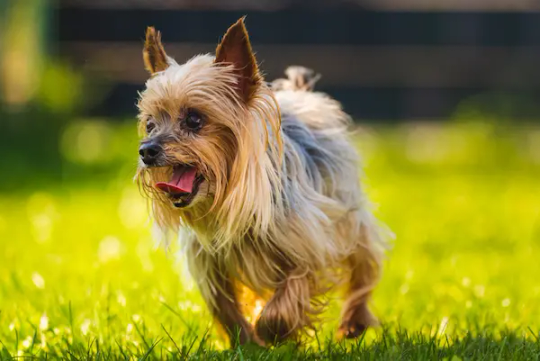
Regular exercise is essential for the overall health and well-being of all dogs, including Yorkies. These small and adorable dogs may not need as much exercise as larger breeds, but they still require daily physical activity to maintain their health and happiness. In this article, we will explore how much exercise Yorkies need, the benefits of regular exercise, suitable exercises, toys and games, training and mental stimulation, creating an exercise routine, and special considerations for Yorkie exercise.
Understanding Yorkie's Exercise Needs Yorkies are a small breed, weighing between 4-7 pounds. They have a moderate energy level and require daily exercise to keep them healthy and happy. The amount of exercise a Yorkie needs depends on various factors, including age, weight, health, and energy level. Generally, a Yorkie needs about 30-60 minutes of exercise per day, which can be divided into shorter sessions throughout the day.
Benefits of Regular Exercise for Yorkies Regular exercise has several benefits for Yorkies, including weight management, improved cardiovascular health, stronger muscles, and better mental health. Exercise also helps to reduce anxiety, stress, and boredom, which can lead to destructive behavior. By providing your Yorkie with regular exercise, you can ensure they live a happy and healthy life.
Key Takeaways
- Yorkies require daily exercise to maintain their health and happiness.
- Regular exercise has several benefits for Yorkies, including weight management, improved cardiovascular health, stronger muscles, and better mental health.
- Suitable exercises for Yorkies include short walks, playtime, and mental stimulation through games and training.
Understanding Yorkie's Exercise Needs
PlayUnderstanding Yorkshire Terrier Exercise Needs and Activities
As responsible pet owners, we must ensure that our Yorkies get enough exercise to maintain their health and well-being. Regular exercise helps to keep them physically fit, mentally stimulated, and happy. However, it is important to understand their exercise needs before starting any exercise routine.
Yorkies are energetic and playful dogs that require regular exercise to stay healthy. According to iHeartDogs, a daily regimen of 30 minutes to an hour of physical activity is typically sufficient to meet their needs. This can be divided into shorter sessions throughout the day to keep them stimulated and content.
It is important to note that the amount of exercise a Yorkie needs depends on various factors such as age, health, fitness, and energy level. As Doggie Sport suggests, too little or too much exercise can be harmful to your dog. Thus, it is crucial to customize their exercise routine based on their individual needs.
When it comes to appropriate exercise for Yorkies, short walks, vigorous physical activity, and mental stimulation are recommended. Oodle Life suggests that Yorkies require approximately 30 minutes of walking each day, so one or two walks will work. For example, one walk for 10 minutes in the morning and another for 20 minutes later in the day. It is important to walk at a brisk pace that is comfortable for them and not too intense that they start panting.
In conclusion, understanding Yorkie's exercise needs is crucial in maintaining their health and well-being. Regular exercise helps to keep them physically fit, mentally stimulated, and happy. It is important to customize their exercise routine based on their individual needs and ensure that they get enough exercise to maintain their health.
Benefits of Regular Exercise for Yorkies
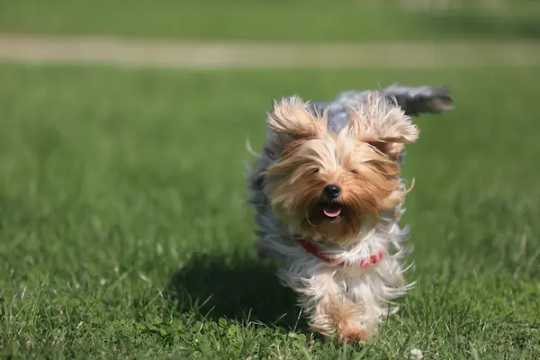
Regular exercise is essential for maintaining the health and happiness of Yorkies. Just like humans, Yorkies need physical activity to stay healthy and fit. In this section, we will discuss the benefits of regular exercise for Yorkies.
Health Benefits
Regular exercise can help Yorkies maintain a healthy weight, which is essential for preventing obesity-related health problems such as diabetes, heart disease, and joint problems. It also helps to strengthen their muscles and joints, which can improve their mobility and reduce the risk of injury.
Yorkies are prone to dental problems, and regular exercise can help to keep their teeth clean and healthy. It increases blood flow to the gums, which can help prevent gum disease and tooth decay.
Mental Health Benefits
Regular exercise is not only good for the physical health of Yorkies but also their mental health. It can help to reduce stress, anxiety, and depression. Exercise stimulates the release of endorphins, which are natural mood boosters. It can also help to improve their cognitive function and memory.
Socialization Benefits
Yorkies are social animals and enjoy interacting with other dogs and people. Regular exercise provides opportunities for socialization, which can help to reduce their anxiety and improve their overall well-being.
Overall Benefits
In summary, regular exercise is essential for the health and happiness of Yorkies. It provides numerous health benefits, including maintaining a healthy weight, improving mobility, and reducing the risk of dental problems. It also provides mental health benefits, such as reducing stress and anxiety and improving cognitive function, and memory. Lastly, it provides socialization benefits, which can improve their overall well-being.
Types of Exercises Suitable for Yorkies
As we discussed earlier, Yorkies are energetic and playful dogs that require regular exercise to stay healthy. In this section, we will explore the types of exercises that are suitable for Yorkies.
Moderate Exercise
Moderate exercise is essential for Yorkies to maintain their cardiovascular health and overall well-being. Walking is a great way to provide moderate exercise to your Yorkie. A daily regimen of two 20-minute walks with a play session in between is typically sufficient to meet their needs. A brisk, steady pace is best for these walks so that the dog is continually moving but not out of breath.
High-Intensity Exercises
In addition to moderate exercise, Yorkies also need high-intensity exercises to keep them stimulated and content. High-intensity exercises include games like fetch, frisbee, jumping, and stair sprints. These games provide a great cardiovascular workout for your Yorkie. However, it is essential to ensure that your Yorkie does not over-exert themselves during these exercises.
Mental Exercise
Mental exercise is equally important for Yorkies as physical exercise. Incorporating games like Tug of War and hide and seek can provide mental stimulation to your Yorkie. These games can help improve their problem-solving skills and keep them mentally sharp.
Cardio Exercise
Cardio exercise is a short but more intense burst of activity, such as running after a ball. It is essential to provide cardio exercise to your Yorkie to keep their heart and lungs healthy. Swimming is also an excellent form of cardio exercise for Yorkies. It is a low-impact exercise that is easy on their joints and provides a great full-body workout.
Overall, providing regular physical and mental exercise to your Yorkie is essential for their overall health and well-being. By incorporating different types of exercises into their daily routine, you can keep them happy, healthy, and stimulated.
Toys and Games for Yorkies
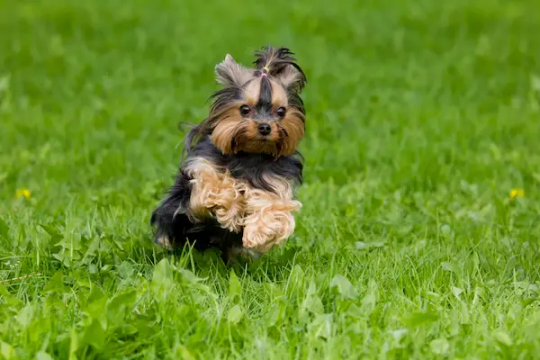
As we know, Yorkies are an active breed of dog that requires regular exercise to stay healthy. However, they also need mental stimulation to keep them happy and content. Toys and games are a great way to provide this stimulation.
Puzzle Toys
Puzzle toys are a great way to keep your Yorkie entertained while also providing mental stimulation. These toys typically require your dog to solve a puzzle or figure out how to get a treat out of the toy. Some popular puzzle toys for Yorkies include the Kong Classic Dog Toy and the Outward Hound Hide-A-Squirrel Puzzle Toy.
Interactive Toys
Interactive toys are another great way to provide mental stimulation for your Yorkie. These toys typically require you to play with your dog, which can also provide bonding time. Some popular interactive toys for Yorkies include the Chuckit! Ultra Ball and the Tug-A-Jug.
Chewing Toys
Chewing toys are important for Yorkies because they can help keep their teeth clean and healthy. They also provide a way for your dog to release energy and stress. Some popular chewing toys for Yorkies include the Nylabone Dura Chew Textured Ring and the Benebone Wishbone.
Other Toys
There are many other types of toys that Yorkies may enjoy, such as plush toys and balls. When choosing toys for your Yorkie, it's important to consider their size and activity level. You should also supervise your dogs while they play with toys to ensure their safety.
Overall, toys and games are an important part of keeping your Yorkie happy and healthy. Puzzle toys, interactive toys, chewing toys, and other toys can provide mental stimulation and help keep your dog entertained. Just remember to choose toys that are appropriate for your dog's size and activity level, and always supervise your dog while they play.
Training and Mental Stimulation
As responsible Yorkie owners, we know that exercise is not just about physical activity. It's also about training and mental stimulation. Yorkies are intelligent dogs, and they need mental enrichment to keep them happy and healthy. Here are some ways to incorporate training and mental stimulation into your Yorkie's exercise routine:
Training Sessions
Training your Yorkie can be a fun and rewarding experience for both you and your dog. Yorkies are quick learners and respond well to positive reinforcement. You can train your Yorkie to do tricks, follow commands, and even participate in agility courses. Regular training sessions not only provide mental stimulation but also strengthen the bond between you and your dog.
Mental Stimulation
Yorkies are curious dogs and enjoy exploring their environment. You can provide mental stimulation by introducing new toys, puzzles, and games. Interactive toys, such as treat-dispensing balls, can keep your Yorkie entertained and mentally engaged for hours. You can also play hide-and-seek or set up an obstacle course in your backyard.
Intelligence
Yorkies are intelligent dogs and need mental stimulation to keep their minds sharp. Regular exercise and mental enrichment can improve your Yorkie's cognitive function and prevent boredom. You can also challenge your Yorkie by teaching them new tricks or commands.
In summary, training and mental stimulation are essential components of your Yorkie's exercise routine. Incorporating these activities into your Yorkie's daily routine can provide mental enrichment, strengthen the bond between you and your dog, and improve your Yorkie's cognitive function.
Creating an Exercise Routine for Yorkies
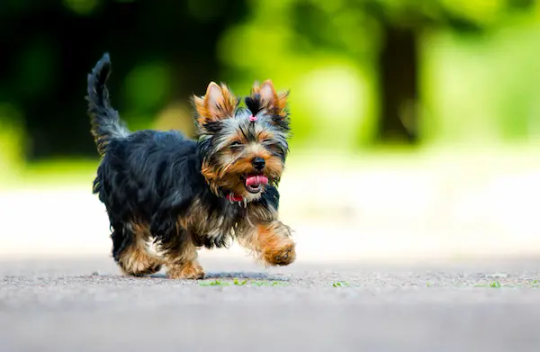
When it comes to creating an exercise routine for Yorkies, it's important to keep in mind that they require a moderate amount of exercise to stay healthy and happy. According to our research, Yorkies typically need between 30 and 60 minutes of exercise per day.
To create a routine that works for both you and your Yorkie, we suggest setting a schedule that includes a morning and evening walk. These walks should be brisk and steady-paced, but not so intense that your Yorkie starts panting.
In addition to walks, it's important to include playtime in your Yorkie's routine. This can include games like fetch, tug of war, or even backyard agility. Mental stimulation is also important, so consider incorporating puzzle toys or training exercises.
To help you create a routine that works for you and your Yorkie, we've provided a sample schedule below:
TimeActivity7:00 AM10-minute walk7:15 AMBreakfast and playtime9:00 AM10-minute walk12:00 PMPlaytime and mental stimulation5:00 PM20-minute walk6:00 PMDinner and playtime8:00 PM10-minute walk before bed
Remember, this is just a sample schedule and you should adjust it to fit your own lifestyle and your Yorkie's needs. The key is to create a routine that includes both physical exercise and mental stimulation and to stick to it as much as possible.
Special Considerations for Yorkie Exercise
When it comes to exercising Yorkies, there are several special considerations to keep in mind. Yorkies are a small toy breed that is agile and energetic, but their small size means they have less energy to expend than larger dogs. Here are some things to keep in mind when exercising your Yorkie:
Exercise Requirements
Yorkies require daily walks and playtime to stay healthy and mentally stimulated. They have a moderate energy level and need around 30 minutes of exercise each day, which can be divided into shorter sessions throughout the day to keep them stimulated and content. A brisk pace is best for these walks so that the dog is continually moving but not out of breath.
Precautions to Take When Exercising Your Yorkie
Yorkies are prone to collapsed trachea, heart problems, and obesity, so it's important to take precautions when exercising them. Avoid high-impact activities that could hurt their joints, and make sure they are at a healthy weight. If you notice any signs of discomfort or fatigue, stop exercising and consult with your veterinarian.
Mentally Stimulated
Yorkies are intelligent dogs and need mental stimulation as well as physical exercise. To keep them mentally stimulated, try playing games like hide-and-seek or treasure hunt. You can also make a homemade obstacle course for them to navigate or teach them new tricks.
Cold and Heat
Yorkies have long coat that keeps them warm in cold weather, but they can still get cold if they are outside for too long. In hot weather, they can easily overheat, so it's important to monitor them closely and provide plenty of water. A dog harness is a good alternative to a collar, as it distributes pressure more evenly and reduces the risk of injury.
Destructive Behavior
If Yorkies don't get enough exercise and mental stimulation, they can become bored and exhibit destructive behavior. To prevent this, make sure they have plenty of toys to play with and take them on daily walks. Tug-of-war and frisbee toss are also great ways to keep them entertained.
By keeping these special considerations in mind, you can ensure that your Yorkie gets the exercise and mental stimulation they need to stay healthy and happy.
Read the full article
0 notes
Text
Are Yorkies Easy to Potty Train? A Comprehensive Guide to Training Your Yorkshire Terrier
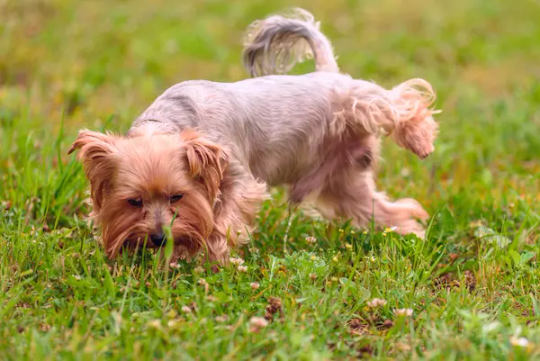
Yorkshire terriers, or Yorkies, are one of the most popular small dog breeds in the world. They are known for their adorable looks, loyalty, and affectionate nature. However, one common question that many potential owners have is whether Yorkies are easy to potty train. In this article, we will explore the different aspects of Yorkie potty training and provide you with the knowledge and tools to help you successfully train your furry friend.
Understanding Yorkies is the first step in potty training them. Yorkies are small dogs that are known for their stubbornness and independent nature. They are also known to have small bladders, which makes them prone to accidents. However, with the right training, they can be taught to go potty at the right time and place. In this article, we will cover the basics of potty training, the challenges you may face, and the tools and techniques you can use to make the process easier.
Key Takeaways
- Yorkies are small dogs that can be trained to go potty at the right time and place.
- Potty training a Yorkie can be challenging due to their stubbornness and small bladders.
- With the right tools and techniques, you can successfully potty train your Yorkie.
Understanding Yorkies
PlayHow Should You Potty Train a Yorkshire Terrier?
When it comes to potty training a Yorkie, it's important to understand the breed's temperament and personality. Yorkies, or Yorkshire Terriers, are small in size but big in personality. They are active, affectionate, and love to be around their owners.
Yorkies have a reputation for being difficult to potty train, but this is not always the case. In fact, with the right training and patience, Yorkies can be successfully potty trained.
One thing to keep in mind is that Yorkies have a small bladder, so they may need to go outside more frequently than larger breeds. It's important to establish a consistent routine for taking them outside to go potty. This can include taking them out first thing in the morning, after meals, and before bedtime.
Another thing to keep in mind is that Yorkies respond well to positive reinforcement. This means rewarding them when they go potty outside, rather than punishing them when they have accidents inside. This can be done with treats, praise, or a favorite toy.
Overall, understanding the unique characteristics of Yorkies can help with potty training and create a strong bond between you and your furry companion.
Basics of Potty Training
Potty training is one of the most important training exercises for any dog, and Yorkies are no exception. It is important to establish a routine and stick to it consistently. Consistency is key to success when it comes to potty training.
When potty training a Yorkie, it is important to choose a designated spot in the yard or inside the house where the dog can relieve itself. We recommend using a crate or a small enclosed area to limit the puppy's access to the rest of the house. This will help the puppy understand that the designated spot is the only place to do its business.
It is also important to establish a feeding routine. Feeding the puppy at regular intervals will help establish a regular potty routine. We recommend feeding the puppy three to four small meals a day at regular intervals. This will help the puppy establish a regular potty routine and make it easier for you to predict when it will need to go.
Repetition is key to success when it comes to potty training. We recommend taking the puppy to the designated spot every two to three hours during the day. This will help the puppy establish a routine and make it easier for you to predict when it will need to go.
In addition to taking the puppy to the designated spot regularly, it is important to praise and reward the puppy when it successfully relieves itself in the designated spot. Positive reinforcement is a powerful tool in puppy training, and it will help the puppy understand that it is doing the right thing.
In conclusion, potty training a Yorkie takes time, patience, and consistency. Establishing a routine, sticking to it, and rewarding the puppy for good behavior are the keys to success. With the right approach, potty training a Yorkie can be a relatively easy and stress-free experience for both the puppy and its owner.
Challenges in Potty Training Yorkies
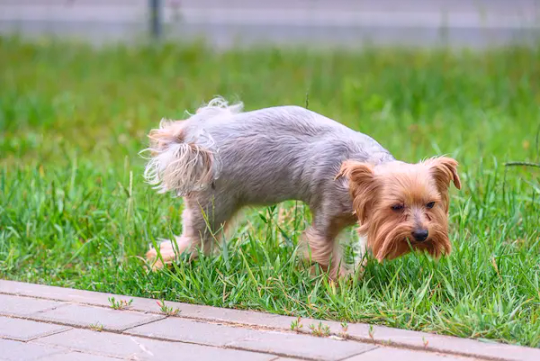
Potty training Yorkies can be challenging due to their small bladder size and tendency to get distracted easily. While Yorkies are intelligent dogs and can learn quickly, they require consistent and patient training to master potty training.
One of the biggest challenges in potty training Yorkies is their small bladder size. Yorkies have a small bladder and need to go out frequently. Failure to provide them with enough opportunities to eliminate can lead to accidents. As a result, it is essential to establish a consistent routine and take them out frequently, especially after meals, playtime, and naps.
Another challenge in potty training Yorkies is their tendency to get distracted easily. Yorkies are curious dogs and can easily get sidetracked by scents, sounds, and sights. As a result, it is crucial to keep them focused on the task at hand and avoid distractions. One way to do this is to take them to a designated potty spot and avoid playing or interacting with them until they have eliminated.
Inconsistent routines can also pose a challenge in potty training Yorkies. Yorkies thrive on routine and need consistency to learn. Deviating from the established routine can confuse them and make it harder for them to learn. As a result, it is essential to establish a consistent routine and stick to it.
Lastly, marking behavior can also be a challenge in potty training Yorkies. Marking behavior is when a dog urinates to mark their territory. Yorkies are known for their marking behavior, and it can be challenging to train them to eliminate only in designated areas. One way to address this issue is to use positive reinforcement and reward them when they eliminate in the designated spot.
In conclusion, potty training Yorkies can be challenging, but with patience, consistency, and positive reinforcement, it is possible to train them successfully. By addressing the challenges mentioned above, we can help our furry friends master potty training and avoid accidents in the house.
Tools for Potty Training
When it comes to potty training your Yorkie, there are a variety of tools that can be helpful. We recommend using a combination of these tools to help your puppy learn where and when to go potty.
Crate Training
Crate training can be a highly effective tool for potty training your Yorkie. Dogs naturally want to keep their living space clean, so a properly sized crate can help prevent accidents indoors. Be sure to choose a crate that is the right size for your puppy, and make it a comfortable and inviting space with soft bedding and toys.
Playpen
A playpen can also be a useful tool for potty training your Yorkie. It gives your puppy a safe space to play and explore, while also keeping them contained and preventing accidents in the rest of your home. Be sure to include a designated potty area within the playpen, such as a pee pad or puppy pad.
Leash and Harness
Using a leash and harness can help you keep your Yorkie close and under control when you take them outside to go potty. It also helps to establish a routine and signal to your dog that it's time to go potty. Be sure to choose a harness that fits well and is comfortable for your puppy to wear.
Pee Pads
Pee pads can be a helpful tool for potty training your Yorkie, especially if you live in an apartment or don't have easy access to a yard. Place the pee pad in a designated potty area, and be sure to praise and reward your puppy when they use it.
Clicker and Timer
Using a clicker and timer can help you establish a consistent routine and reinforce good potty training behavior. Use the clicker to mark when your puppy goes potty in the designated area, and set a timer to remind you to take your puppy outside at regular intervals. Be sure to praise and reward your puppy each time they go potty in the designated area.
Overall, potty training your Yorkie takes patience, consistency, and a variety of tools and techniques. With the right approach, your puppy can learn to go potty in the designated area and become a well-trained and well-behaved member of your family.
Effective Techniques for Yorkie Potty Training
Potty training a Yorkie can be a challenge, but with the right techniques, it can be a rewarding experience. We have found that positive reinforcement is the most effective training technique for Yorkies. This means rewarding your Yorkie for good behavior, rather than punishing them for bad behavior.
One way to use positive reinforcement is by giving your Yorkie treats when they go potty outside. This helps them associate going potty outside with something positive and reinforces the behavior. We recommend using small, soft treats that your Yorkie can easily chew and swallow.
In addition to treats, verbal praise can also be effective. When your Yorkie goes potty outside, use a command word such as "go potty" or "do your business". When they successfully go potty, use verbal praise such as "good job" or "good boy/girl". This helps them associate the command word with the behavior and reinforces the positive behavior.
Consistency is also key when it comes to potty training. Stick to a regular schedule for feeding and going outside. Take your Yorkie outside first thing in the morning, after meals, and before bedtime. This helps them establish a routine and makes it easier for them to understand when it's time to go potty.
Lastly, it's important to be patient and consistent with your training techniques. Yorkies can be stubborn, so it may take some time for them to understand what you want them to do. But with patience and consistency, you can successfully potty train your Yorkie.
Addressing Accidents
When it comes to potty training a Yorkie, accidents are inevitable. It's important to remember that accidents are a natural part of the process and should not be punished. Punishing your Yorkie for having an accident can actually be counterproductive and may lead to anxiety and fear.
Instead, we recommend using positive reinforcement to encourage good behavior. When your Yorkie goes potty outside or on their designated potty pad, be sure to praise them and offer a treat. This will help them understand that going potty in the right place is a good thing.
When accidents do happen, it's important to clean them up properly. We recommend using an enzymatic cleaner to eliminate any odors. This will help prevent your Yorkie from going potty in the same spot again.
It's also important to be patient during the potty training process. Yorkies are small dogs with small bladders, so they may need to go potty more frequently than larger breeds. Stick to a consistent schedule and be prepared to take your Yorkie outside or to their potty pad frequently.
In summary, accidents are a natural part of potty training a Yorkie. Use positive reinforcement, clean up accidents properly, and be patient during the process. With time and consistency, your Yorkie will become fully potty trained.
Indoor Vs Outdoor Training
When it comes to potty training Yorkies, one of the most common questions is whether to train them indoors or outdoors. The answer to this question depends on various factors, such as your living situation and your puppy's lifestyle.
Indoor Training
Indoor training involves using puppy pads or litter boxes to train your Yorkie to go potty inside. This method is ideal for people who live in apartments or condos or those who have limited access to the outdoors. Indoor training is also suitable for people who live in areas with extreme weather conditions, such as heavy rain or snow.
To start indoor training, choose a designated area in your home where your puppy can go potty. Place puppy pads or a litter box in that area and encourage your puppy to use it. Praise your puppy when they use the designated area and clean up any messes immediately to prevent any odors.
Outdoor Training
Outdoor training involves taking your Yorkie outside regularly to go potty. This method is ideal for people who have access to a yard or live in areas with mild weather conditions. Outdoor training also provides your puppy with an opportunity to get exercise and fresh air.
To start outdoor training, pick a potty spot in your yard and take your puppy there regularly. Use verbal commands to encourage your puppy to go potty and reward them with treats or praise when they do. Consistency is key when it comes to outdoor training, so make sure to take your puppy outside regularly, especially after meals or naps.
In conclusion, whether to train your Yorkie indoors or outdoors depends on your living situation and your puppy's lifestyle. Indoor training is ideal for people who have limited access to the outdoors or live in areas with extreme weather conditions, while outdoor training is suitable for people who have access to a yard or live in areas with mild weather conditions. Regardless of the method you choose, consistency and patience are essential for successful potty training.
How Long Does It Take to Potty Train a Yorkie
Potty training a Yorkie can take anywhere from 2 to 4 months for home training and around 2 to 6 weeks for outdoor training, depending on various factors.
One of the most important factors is the age of the Yorkie. As a puppy, Yorkies won't yet have full control over their bladder and bowel muscles. You can generally expect a two-month-old puppy to last around two hours, a three-month-old to last three, and so on. So it is important to be patient and consistent with the training process.
Another factor that can affect how long it takes to potty train a Yorkie is bladder control. Some Yorkies may have weaker bladder muscles than others, which can make it more difficult for them to hold their urine for long periods of time. In such cases, it may take longer to potty train the Yorkie.
Consistency is key when it comes to potty training a Yorkie. Establishing a consistent routine for taking them outside to eliminate, using positive reinforcement such as treats and praise for successful elimination outside, and supervising them closely inside to prevent accidents can all help speed up the potty training process.
It is important to note that every Yorkie is different, and some may take longer to potty train than others. However, with patience, consistency, and positive reinforcement, most Yorkies can be successfully potty trained within a few months.
Advanced Topics in Yorkie Potty Training
When it comes to potty training your Yorkie, there are some advanced topics that you should be aware of. These topics include housebreaking, designated potty areas, territorial behavior, marking, separation anxiety, and confined areas.
Housebreaking
Housebreaking is an essential part of potty training your Yorkie. It involves teaching your dog to eliminate outside and not inside your home. To housebreak your Yorkie, you need to be consistent with your training and patience. You should take your Yorkie outside frequently, especially after meals and naps. You should also reward your Yorkie when they eliminate outside and not punish them when they eliminate inside.
Designated Potty Area
A designated potty area is a specific spot outside where you take your Yorkie to eliminate. This area should be away from high-traffic areas and should have a distinct scent that your Yorkie can recognize. You should take your Yorkie to this area every time they need to eliminate so that they can associate the scent with the act of elimination.
Territorial Behavior and Marking
Yorkies are known to be territorial, and they may mark their territory by urinating in various spots around your home. To prevent this behavior, you should establish yourself as the pack leader and provide your Yorkie with plenty of exercise and mental stimulation. You should also clean up any accidents immediately to remove the scent and discourage marking.
Separation Anxiety
Yorkies are prone to separation anxiety, which can lead to accidents inside your home. To prevent this behavior, you should gradually get your Yorkie used to being alone for short periods. You should also provide your Yorkie with plenty of toys and mental stimulation to keep them occupied while you are away.
Confined Area
When you are not able to supervise your Yorkie, you should confine them to a specific area, such as a crate or playpen. This area should be large enough for your Yorkie to move around comfortably but small enough to prevent accidents. You should also provide your Yorkie with plenty of toys and water while they are confined.
In conclusion, potty training your Yorkie requires patience, consistency, and knowledge of advanced topics such as housebreaking, designated potty areas, territorial behavior, marking, separation anxiety, and confined areas. With proper training and attention, your Yorkie can become housebroken and eliminate outside.
Common Mistakes and How to Avoid Them
When it comes to potty training a Yorkie, there are some common mistakes that many owners make. By avoiding these mistakes, we can make the process smoother and more successful.
Starting too Early
One of the biggest mistakes that owners make is starting potty training too early. Puppies are not able to control their bladders until they are about 12 weeks old. Trying to potty train a puppy before they are ready can lead to frustration and accidents. It is important to wait until they are physically and mentally ready before beginning the process.
Lack of Supervision
Another common mistake is not supervising the puppy closely enough. Puppies have small bladders and need to go outside frequently. It is important to supervise them at all times when they are not in their crate. This means keeping a close eye on them and taking them outside often.
Read the full article
0 notes
Text
Are Yorkies Good with Cats? Tips for Helping Your Yorkie and Cat Coexist in Harmony.

The Yorkshire Terrier is a small, toy-sized terrier weighing no more than seven pounds with a long, silky coat and a dark golden tan as its crowning glory. Let's find out about the Yorkies' personality, including whether are Yorkies good with cats or not!
Don't let the timidness of Yorkie confuse you. The Yorkie is tenacious, feisty, brave, and often bossy and displays all the characteristics of a true terrier. Yorkies are the most common type of dog in many big cities in America. These tiny dogs have big personalities. They act like they are from the city. Yorkies are little but important. These are the favorites of young people around the world.
Are Yorkies Smart
What You Should Know About The Yorkie
Yorkies are long-term and low-allergenic and make excellent little watchdogs. This is a real "personality race," which offers years of fun, love, and close association.
General
This dog has long hair and is a toy terrier breed. It has a blue and tan coat. The hair hangs down evenly on both sides of the body. It goes from the bottom of the head to the end of the tail. The hair on the sides is completely straight. The body is sound, lightweight, and well-balanced. The high carriage of the dog and its relaxed manner will offer the impression of vigor and autonomy. Yorkies are also known to be cool companion animals.
The head is not too large or round; the muzzle is not too long, the bite is not undershot or overshot, and the teeth sound. The eyes are moderate in size and not too prominent; dark in color, with a sharp, smart expression. The rims of the eye are black. The ears are small, V-shaped, upright, and not too distant.
Coat
The consistency, texture, and quantity of the coat are paramount. Hair, in its composition, is vivid, beautiful, and silky. The coat is medium long and perfectly straight (not wavy) on the body. It can be cut to the floor's length to make the movement smoother and look nicer if desired.
The head fall is long, connected to the middle of the head by one bow divided into the middle, and bound to two bows. Hair is very long on the muzzle. Hair should be cut short on ear tips and trimmed on feet to make them look clean.
Food
Yorkshire Terriers should eat high-quality dog food. The food can be store-bought or made at home. But you should check with your vet first to make sure it's healthy for your dog. Yorkshire Terriers need good food in the right amount. Each diet should be appropriate for the age of the dog. Many dogs are susceptible to being overweight so you might want to track the calories and weight of your dog.
Treats can be a significant training aid, but the problem of obesity can be caused by too many. Learn which human food is safe and which is not safe for dogs. Consult with your doctor if you have any questions about the weight or diet of your dog. Clean, clean water should always be available.
The Truth About Yorkies and Cats
PlayYorkie plays with Cat
It's a good idea to know how Yorkshire Terriers and cats usually work before you agree to get them under the same roof. Are Yorkies good with cats?
All dogs and cats have their own personalities. But there are some general things to remember if a cat and a Yorkie live in the same house. Each pet will act differently. But some rules can help them get along.
In comparison to some other toy dog breeds, many Yorkshire Terriers are relatively the same or smaller in size than other cats. Yorkies are usually between 3 and 7 lbs. While some are bigger, the house cat typically is 7.9–9.9 lbs.
This is a plus, which can lead both to get along well. And, in some situations, the cat will become more significant than the Yorkie.
This is not always a concern as both are introduced young and have a bond long before the cat grows more significantly than the dog.
There's no overly powerful desire for chasing. Yorkshire Terriers were bred to be ratters. That means they hunted and caught small mice. So Yorkies have a sense of chasing and catching prey. But cats don't do that. Cats and Yorkies have different instincts.
Of course, if you the owner have a larger-than-average Yorkie and place him with a tiny kitten in the same room, maybe this isn't the best idea. Nevertheless, there is usually no clear prey-driven instinct to chase cats aside from the primary, obviously, dog-to-cat relationship.
Yorkies May or May Not Be Good With Cats
It all depends on how you parent them. First, it takes them a while to warm up to other pets, but then they get along really well. Yorkies are smart. They know if a dog is bigger than them. They won't try to overpower a large dog. Instead, Yorkies will learn to get along with a bigger dog.
Can Yorkies have cats as playmates? Can a Yorkie have a kitten as a brother or sister?
Yorkies should never, however, be kept in a room with small animals such as rabbits or birds unattended. On the other hand, Yorkies are good with cats.
If you own a Yorkie, you can never raise small animals because they have a hunting instinct that looks like a beast. Yorkies are also competitive quickly if they are not given enough publicity and often fight for the spotlight with other animals.
Are Yorkies Good With Cats?

There are dogs as well as feline people, but what about us who like them both? Can we have both a cat and a dog in our home, or are they, mortal opponents? Can a Yorkie have a cat companion? Here's what you should know, Yorkies are good with cats.
Feel confident; dogs and cats will become best friends or learn to live side-by-side peacefully. When you have a cat in your house and want a canine, choosing the right breed will probably take you a long way to a harmonious relationship.
Many breed types are more likely than others to get along with cats. For example, the Toy Community consists of careful and friendly dog breeds. They have been replicated as buddies and lap warmers.
Sporting Party members get together and outbound as well. Such cheerful dog breeds can make friends with everyone they encounter, including pet cats.
The perky Terrier breeds were developed to hunt and kill vermin, on the other hand. A rapidly moving cat may cause these hard predatory reactions, as well as the Hound Group's sighthounds, which are hardwired for a chase. No feline will undoubtedly appreciate the goal of this kind of focus.
Some dogs in the Herding Group try to chase everything that moves. This includes their owner and babies. These herding dogs want to control the movement of people and animals.
Introducing Your Cat and Yorkie to Each Other
It is a good idea to consider different ways to make sure they both do well before you agree to put them under the same roof.
Evaluate both animals individually.
Take note of at least one week of the actions of both pets separately to see if they are violent or friendly. When they are the kind who can live in peace with other animals, they are less likely to start a world war in the house.
Present them when young.
Since puppies and kittens do well, this is the perfect way to raise all when you're worried about the house becoming a pet war zone. That will ensure that they both grow accustomed and prevent extreme struggles between them. They should become good pets.
Slowly add them.
It's not a smart idea to introduce a cat unexpectedly and push your Yorkie to come along. This just leads to aggressive behavior and actions against one another. Never leave them at home unattended in the initial days as they still step on each other's eggshells. You should first let them smell each other's fragrances and then get them back together gradually.
Offer them a place for themselves.
It is also essential to separate all their things, such as bowls and animal beds. This will keep them from searching again and again for food or a decent place to sleep.
Animals also consider others as a hazard when it comes to things like litter boxes, so specific ones should be given to them. Yorkshire terriers and cats can be very aggressive. They may fight if one gets into the other's personal space. You can prevent fights by giving them their own space. Don't let them invade each other's areas. They should also have escape routes.
Give them ample attention.
The key to raising both of them without any problems is to give them the same attention, so they don't feel threatened.
What You Should Do When They Do Not Get Along
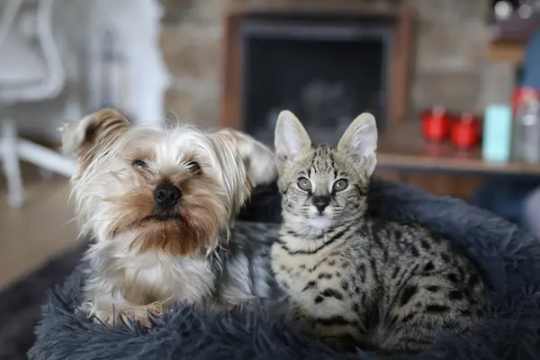
When a new cat and Yorkie first meet, watch them closely. If there are big problems with chasing and fighting in the first 2-3 weeks, that's a big warning. It means they won't get along. Also, watch for any injuries. If one pet gets hurt, they likely won't be friends.
Although most Yorkies do fantastic things with cats, there will always be times when it doesn't work. You should plan for the chance that they won't get along. You may need to keep them apart all the time. Or you may have to find a new home for the cat or dog. It's an unusual situation but can happen. Be ready in case they can't live together peacefully.
It's not unusual for a dog and a cat to play well, but one of the other pulses while one is still strong. There can also be issues where there are broad age gaps, and an older animal does not forgive for a young animal's hyperplay.
If your Yorkie gets upset by the cat, firmly say "no." Break up any fights, and separate them for a timeout. This training will help short term. Doing it each time will lead to better behavior. They'll learn what is and isn't allowed in your home when you repeat this.
When people don't discuss whether cats or dogs are smarter, they equate them as deadly enemies.
Cats are usually remote and easily shocked, whereas dogs are gregarious and territorial. However, that doesn't mean they can't share the same space — they'll just need your support. When cats and Yorkies live in a happy home, they can at least be friendly. Give them lots of affection and encouragement. This positive environment will help them get along and be friends.
1. Consider the personality.
Unlike popular belief, some breeds of cats and dogs are usually not much better than others. To get a cat and Yorkie to get along, look at their personalities and energy. Also, think about the cat's viewpoint and the Yorkie's viewpoint. Their different perspectives matter when getting them to live together. A household with a skittish cat does not suit very well when a dog is violent and defensive. An old dog, by comparison, would have to share his home with a wild kitten.
If the cat and dog don't match well personality-wise, have a backup plan. You may need to keep them apart long-term. If their personalities clash, they may not be able to live together peacefully. Before you take a pet, do your diligence and ask previous owners or shelters whether they have worked with or are getting along with other animals.
2. Train your dog.
To make your dog competitive with cats, Sandor says, teach it to control its impulses. Does it run around the kitchen when someone drops a cookie, or does a squeaky toy go on high alert? If so, it'll probably not be perfect for cats right off the bat because it will probably pop up when a feline is found.
3. Give your cat territory.
House Cats need a secure area in the home— a kind of "base camp"—or the nest that's theirs. Make this refuge in the home unlimited for the dog, but also build safe areas around the house. In this way, the cat can sail safely from his canine sibling through the shared territory.
Buy big cat trees, put shelves, or put a cat bed on top of a bookcase. It helps the cat from a safe distance to watch the dog or enter a space without hitting the floor.
And keep your dogs away from the litter box while you're there. You could use baby gates as Yorkies can't jump over the baby gate. Cats need to feel safe and have ways to escape. Dogs sometimes eat cat food and poop. This bad habit can give dogs worms. Make sure the cat has safe spaces the dog can't reach. Keep cat food and litter box away from your Yorkie. Such worms can lead to several health problems, including vomiting, diarrhea, loss of weight, and anemia.
Baby gates can be a temporary solution, but some dogs are experts at escaping. To prepare for worst-case scenarios, it's important to check for any potential escape routes and secure them. This includes uncovering and opening any litter boxes that your dog may be able to access. The cat would not be cornered in a stressful situation and stuck in the middle of squatting in that way.
4. Exercise your dog.
Owners usually exercise their dogs 20 percent of what they really can do. Your energy needs to be released somewhere else to calm down your mind and control yourself while you are around kitties.
Dogs need a lot of stimulation, as well. The controlled reception of it makes them less likely to satisfy it by chasing a cat.
Instead of just walking, stopping, and sitting on every block five times. And change direction three times on each line, or change speed two times. It's about unleashing your instincts and the drive of prey suitably.
5. Encourage them both.
It's a wise idea to encourage cats and dogs to sniff each other's bedding and toys before meeting each other. We will, therefore, satisfy their curiosity and stop future turf wars, get along well, and eventually become a peaceful family unit in the home.
6. Plan the encounter carefully.
Unlike humans, cats and dogs have only one decent chance to have a perfect first impression. Thankfully, both of them enjoy food that might potentially make them enjoy one another.
Plan the first-time cat-dog meeting for lunch but keep the Yorkshire terrier dog on a leash, as well as both animals on the other side of a closed door. You will not see each other, but you can smell each other as you chow down. You will start combining this smell situation with food, making it a good thing.
Are Yorkshire Terriers Good With Cats?Yorkies and cats can be friends if introduced the right way. The most important things are to make sure they are both comfortable with each other and to praise the Yorkie when it is nice to the cat.
Introduce them when they are young so they get used to each other. Make sure the cat and Yorkie play well and do not fight.
Give the Yorkie lots of treats and pats when you see it being gentle. This will teach it that the cat is not scary.
Make sure each pet has toys to play with. Give them space to play alone but also time to play together.
Watch them when they are together at first. If they are nice, cheer for them. If not nice, separate them for a bit.
Have places where each feels safe like beds. But also let them be together and see if you are happy about it.
Be patient - it takes time but with rewards for good behavior, playtime, and comfort, your Yorkie and cat can be pals! Keep introducing them nicely to a happy home together.
Final Words
Yorkies may seem small but they have big personalities. If not trained the right way, they can act aggressively towards cats. Yorkies may bark at, threaten, or even attack cats.
If your Yorkie is too energetic around cats, check a few things. Make sure your Yorkie is healthy. Also, look at its training. With the right care and training, Yorkies can learn to get along with cats.
Some ways to help are exercise so they have energy out. Also, teach your Yorkie good behaviors around cats with rewards. With patience, your Yorkie will understand cats are friends, not foes. Working on training means Yorkies can be friendly with felines.
Read the full article
0 notes
Text
The Ultimate Guide to Yorkie Breeding: 10 Expert Tips for Success
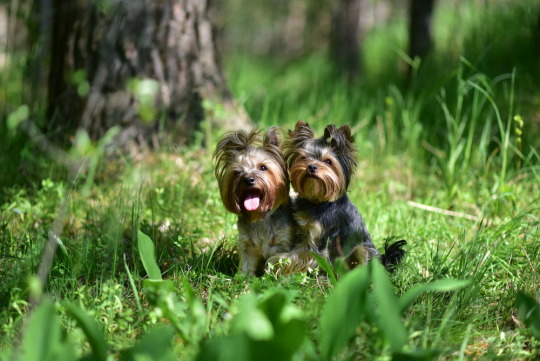
Welcome to our guide on Yorkie breeding! As experienced breeders ourselves, we know how rewarding and fulfilling it can be to raise these wonderful dogs. However, breeding Yorkies requires more than just passion – it also requires knowledge and responsibility. That's why we've put together this comprehensive guide to help both novice and experienced breeders alike.
In this section, we'll provide you with 10 expert tips that will ensure a successful Yorkie breeding journey. We'll cover everything from selecting healthy parent Yorkies to preparing for the breeding process and caring for newborn puppies. By following these tips, you'll be well on your way to becoming a responsible Yorkie breeder.
Key Takeaways:
- Yorkie breeding requires responsibility and knowledge.
- Selecting healthy parent Yorkies is crucial for the puppies' well-being.
- Proper planning is essential for a successful breeding program.
- Preparing for the breeding process ensures a smooth and safe experience.
- Caring for the pregnant mother and newborn puppies is crucial.
Understanding Yorkshire Terrier Breed Standards
As responsible Yorkie breeders, it's crucial to understand the breed standards set by reputable organizations. This knowledge helps us strive towards producing healthy and well-tempered Yorkies that adhere to these standards.
The Yorkshire Terrier breed has specific physical and behavioral characteristics that define them. These standards serve as a guideline to ensure that Yorkies conform to their breed standard and are physically and mentally healthy.
Physical Appearance
A Yorkie's physical appearance is one of the most defining characteristics of the breed. According to the American Kennel Club (AKC), Yorkies should have a compact, well-proportioned body with a level topline and a silky, straight coat that is tan and blue in color. The coat should be glossy and fine in texture, with hair that is long and flowing on the head, chest, and legs.
Yorkies should also have a small, flat head with a black nose, dark eyes that are medium in size, and small V-shaped ears that are erect.
It's important to note that breeders should never prioritize appearance over a Yorkie's overall health and well-being.
Temperament
Yorkshire Terriers are known for their confident, spunky, and affectionate personalities. They are also intelligent and trainable, making them great companions.
As responsible breeders, it's essential to prioritize a Yorkie's temperament when breeding. Ensuring that both parent Yorkies have good dispositions and personalities can help ensure that their offspring will develop similar characteristics.
Breed Standards
Breed Standards for Yorkshire TerriersDescriptionHeight8-9 inches at the shoulderWeight4-7 poundsCoatLong, silky, straight, and glossyColorTan and blueHeadSmall and flat with a black noseEarsSmall, V-shaped, and erectEyesDark, medium sized
By understanding the breed standards and prioritizing health and temperament, responsible Yorkie breeders can help preserve and improve the breed while producing happy and healthy puppies.
Selecting Healthy Parent Yorkies

As responsible Yorkie breeders, we understand the importance of breeding healthy puppies. Selecting healthy parent Yorkies is crucial for achieving this goal. Here are some tips on how to choose reputable breeders and ensure that your parent Yorkies are healthy:
- Research reputable breeders: Look for breeders who have a good reputation and are known for producing healthy puppies. You can ask for recommendations from other breeders or check online forums and websites.
- Check for health clearances: Reputable breeders will provide health clearances for their parent Yorkies. These clearances are issued by veterinary specialists after a thorough examination of the dog's health history and medical records. Health clearances can include OFA (Orthopedic Foundation for Animals) evaluation for hip dysplasia, eye clearances, and genetic testing.
- Meet the parent Yorkies: Before breeding, it's important to meet the parent Yorkies in person. This will give you a chance to evaluate their temperament and look for any signs of illness or health issues. Make sure that both the male and female Yorkies are healthy and free from any genetic disorders.
- Ask about the breeding process: Reputable breeders will be transparent about their breeding process. Ask about how often they breed their Yorkies and what steps they take to ensure the health and safety of the puppies. A responsible breeder should be willing to answer any questions you have and provide you with references from previous clients.
- Consider the age of the parent Yorkies: It's important to breed Yorkies who are in their prime reproductive years. For females, this is typically between the ages of 2 and 5 years old, while males can be bred up to the age of 7 years old. Breeding Yorkies outside of these age ranges can increase the risk of complications and health issues for the mother and puppies.
- Look for red flags: Beware of breeders who offer to sell you puppies without health clearances or who breed Yorkies too frequently. Additionally, avoid breeders who don't allow you to meet the parent Yorkies in person or who are unwilling to answer your questions.
By following these tips and working with reputable breeders, you can ensure that your parent Yorkies are healthy and that you are on the path to responsible Yorkie breeding.
Planning the Breeding Process
Planning is an essential part of any successful Yorkshire Terrier breeding program. Before beginning the breeding process, it's important to carefully consider your goals and develop a breeding plan that aligns with them. There are several factors to keep in mind when planning the breeding process:
- Choosing the right time for breeding: When planning the breeding process, it's important to consider the female Yorkie's heat cycle. The heat cycle typically occurs every 6-8 months and lasts for about 2-3 weeks. To determine the best time for breeding, you can monitor the female's progesterone levels or use an at-home ovulation test kit.
- Understanding the heat cycle: The heat cycle is divided into three stages: proestrus, estrus, and diestrus. During proestrus, the female's body prepares for breeding, and her behavior may change. Estrus is when the female is receptive to mating, while diestrus is a period of hormonal balance after mating.
- Developing a breeding plan: Your breeding plan should outline the goals for your breeding program, including factors such as temperament, health, and conformational standards. You should also consider the potential risks and challenges of breeding, such as genetic disorders or complications during pregnancy and delivery.
In addition to these factors, it's important to work with reputable Yorkie breeders and consult with a veterinarian throughout the breeding process. With careful planning and attention to detail, you can ensure a successful and responsible Yorkshire Terrier breeding program.
Preparing for Breeding
Before the breeding process can begin, there are several preparations that need to be made. These preparations ensure a smooth and safe breeding process that can maximize your chances of producing healthy Yorkie puppies.
Gather Necessary Equipment
First, make sure you have all the necessary equipment on hand. This includes items such as:
- Stud service contract (if you are using a male from another breeder)
- Artificial insemination supplies (if you are using this method)
- Clean towels for clean-up
- Nail clippers to trim nails as needed
- Whelping box for the expecting mother
Prepare the Female Yorkie
It's important to make sure the female Yorkie is in optimal health before breeding. This includes getting a pre-breeding veterinary check-up to ensure she is free from any health issues that may cause complications during pregnancy or whelping.
Additionally, you should prepare your female Yorkie mentally by keeping her happy and stress-free. This can be done by providing plenty of exercise, socialization, and affectionate attention.
Prepare the Male Yorkie
Just like the female Yorkie, the male should be free from any health issues that may impact breeding. He should also be physically and mentally prepared for breeding. This can be achieved by providing him with plenty of exercise, proper nutrition, and attention.
Observe the Female's Heat Cycle
Observing the female's heat cycle is crucial in determining the optimal time for breeding. This involves keeping track of her menstrual cycle and observing her behavior to identify when she is in heat. It's important to be patient and wait for the right time to begin breeding.
Develop a Breeding Plan
Finally, it's important to have a solid breeding plan in place. This involves determining the ideal time for breeding, developing a timeline for the process, and outlining a plan for the care of the mother and her puppies.
The Breeding Process
Once you have selected healthy parent Yorkies and planned the breeding process, it's time to move on to the actual breeding. This can be an exciting and nerve-wracking time, but with proper preparation and knowledge, you can ensure a successful and responsible breeding process.
Introducing the Male and Female Yorkies
The first step in the breeding process is to introduce the male and female Yorkies. This should be done in a neutral and comfortable location, such as a park or backyard. It's important to supervise the interaction to ensure that both dogs are behaving appropriately and safely.
One important thing to keep in mind is that female Yorkies have a specific heat cycle in which they are receptive to mating. It's crucial to wait until the female is in heat before attempting to breed. This will increase the chances of successful mating and pregnancy.
Monitoring the Mating
Once the male and female Yorkies have successfully mated, it's important to monitor their behavior and ensure that the mating has been successful. Signs of successful mating include the male mounting the female and a tie between the male and female, which is when their genitalia become locked together for several minutes.
It's important to note that not all matings result in pregnancy. Keep a close eye on the female Yorkie's behavior and look for signs of pregnancy, such as a decrease in appetite and a change in behavior.
After the Breeding
After the breeding process is complete, it's important to provide proper care and support for both the male and female Yorkies. This includes providing nutritious food, ensuring they have access to water at all times, and monitoring their behavior and health.
If the mating is successful, the female Yorkie will go through a pregnancy and whelping process, which will require additional care and attention. Stay tuned for our next section, where we will cover everything you need to know about pregnancy and whelping.
Pregnancy and Whelping
As responsible breeders, it's our duty to provide proper care and support to the expecting mother during her pregnancy and whelping process. This ensures the well-being of both the mother and her puppies.
Pregnancy
The pregnancy of a Yorkie typically lasts around 63 days. During this time, the mother should receive adequate nutrition and exercise to maintain her health and that of her developing puppies.
It's recommended to take the mother to the veterinarian for regular check-ups to monitor her pregnancy and ensure that everything is progressing normally. The vet may perform ultrasounds to determine the number of puppies, their size, and health, and to estimate the due date.
Whelping
The whelping process refers to the act of birthing puppies. It's crucial to prepare a safe and comfortable environment for the mother to give birth in, such as a whelping box with soft bedding and a heating pad for warmth.
During the whelping process, the mother may require assistance from the breeder, especially if it's her first litter. It's important to monitor the mother for any signs of distress or complications, such as difficulty in giving birth or problems with milk production.
Signs of LaborAction RequiredIncrease in body temperatureMonitor for other signs of laborRestlessnessPrepare the whelping areaNesting behaviorPrepare the whelping areaIncrease in licking of genital areaMonitor closely for signs of laborBloody vaginal dischargeMonitor closely for signs of labor
After the puppies are born, it's important to monitor them for any signs of distress or health issues. The breeder should pay close attention to their weight and ensure they are nursing properly. Any concerns should be brought to the attention of the veterinarian.
Overall, the pregnancy and whelping process requires careful attention and preparation to ensure a safe and successful birth. By following responsible breeding practices, we can ensure the health and well-being of the mother and her puppies.
Raising Yorkie Puppies
Raising Yorkie puppies is an exciting and rewarding experience, but it also requires a lot of hard work and dedication. Here are some important tips to keep in mind as you prepare to welcome your new litter of Yorkie puppies into the world.
Socialization
Socialization is crucial for the healthy development of your Yorkie puppies. Start early by exposing them to a variety of people, places, and experiences. This will help them become well-adjusted and confident adult dogs.
Some ways to socialize your Yorkie puppies include:
- Inviting friends and family over to meet the puppies
- Taking the puppies on short car rides
- Introducing the puppies to other friendly dogs
Nutrition
Providing proper nutrition is essential for the health and growth of your Yorkie puppies. Make sure to feed them high-quality puppy food that is appropriate for their age and size. You may also want to supplement their diet with vitamins and minerals to ensure they are getting all the nutrients they need.
It's important to monitor your puppies' weight and adjust their feeding schedule accordingly. Overfeeding can lead to obesity and other health problems, while underfeeding can cause stunted growth and malnutrition.1
Healthcare
Regular veterinary care is essential for keeping your Yorkie puppies healthy. Make sure to schedule regular check-ups and vaccinations to protect them from common illnesses and diseases.
It's also important to keep your puppies clean and groomed. Yorkies have long, silky hair that requires regular brushing and trimming to prevent matting and tangles. You may also want to consider having their teeth cleaned regularly to promote good dental health.
Training
Training your Yorkie puppies is important for their safety and well-being, as well as your own. Start by establishing basic commands like "sit," "stay," and "come." You may also want to consider crate training to help with housebreaking and to give your puppies a safe and secure place to rest.
Positive reinforcement is the most effective way to train your Yorkie puppies. This can include treats, praise, and affection. Consistency is key, so make sure everyone in your household is on board with the same training methods.
With these tips in mind, you can provide the best possible care for your Yorkie puppies and help them grow into happy, healthy adult dogs.
Finding Responsible Homes for Yorkie Puppies
At the end of the day, responsible Yorkie breeders prioritize finding suitable homes for their puppies. This involves careful screening of potential owners to ensure they have the necessary resources and experience to provide a loving and safe home.
One way to find responsible homes is to create a waiting list of interested parties. This allows breeders to assess each applicant's suitability and match them with the right puppy based on their lifestyle and needs.
Another important consideration is ongoing support. Responsible breeders should be available to their puppy owners even after the sale is complete. This means answering questions, offering advice, and providing resources to help the new owners care for their Yorkie puppy.
When marketing Yorkie puppies for sale, responsible breeders should provide clear and accurate information about the puppy's health, temperament, and lineage. This helps potential owners make informed decisions and ensures the puppies go to suitable homes.
Sample Table: Comparing Potential Owners
Applicant AApplicant BApplicant CExperience with YorkiesOwned two Yorkies in the pastFirst-time ownerGrew up with YorkiesLiving SituationLives in a small apartment with no yardLives in a suburban house with a fenced yardLives in a rural area with plenty of space to runOther PetsNo other petsHas a catHas a large dogReferencesProvided references from previous Yorkie breederProvided references from friends and familyNo references provided
As you can see from the sample table above, comparing potential owners can help you make informed decisions and find the best possible homes for your Yorkie puppies.
Conclusion
As responsible Yorkie breeders, we understand the importance of knowledge and dedication when it comes to breeding these wonderful dogs. By following the expert tips we have provided, you can ensure a successful breeding journey that benefits both the breed and the puppies.
It's essential to have a thorough understanding of the Yorkshire Terrier breed standards and to select healthy parent Yorkies. Proper planning and preparation are crucial for a safe and smooth breeding process, and providing care and support for pregnant Yorkies and newborn puppies is vital.
Read the full article
0 notes
Text
Discover How Long Do Yorkies Live - Your Ultimate Guide

Welcome to our comprehensive guide on how long do Yorkies live. If you're a Yorkshire Terrier owner, or thinking about bringing one into your family, it's important to understand their average lifespan and the factors that can impact it.
Yorkshire Terriers are a popular breed known for their small size, big personality, and affectionate nature. As with any pet, it's important to provide them with proper care and attention to ensure they live a happy and healthy life. Let's dive into the topic of Yorkie lifespans and explore how you can optimize their longevity.
PlayYorkshire Terrier Dog | Lifespan, Temperament & More | Petplan
Key Takeaways:
- Yorkshire Terriers have an average lifespan of 12-15 years.
- Factors such as genetics, diet, exercise, healthcare, and lifestyle can impact a Yorkie's lifespan.
- Proper care, nutrition, and addressing health issues promptly can contribute to a Yorkie's overall well-being and longevity.
- As Yorkies age, their care needs may change, so it's important to understand and accommodate for these changes.
- By providing a loving and supportive environment, you can ensure your Yorkie companion enjoys a fulfilling and happy life for many years.
Understanding the Yorkshire Terrier Breed
Before we dive into the lifespan of Yorkies, let us understand the characteristics and traits of the Yorkshire Terrier breed. Yorkies are small in size, weighing between four to seven pounds, and measuring between six to nine inches in height. They have a lively and affectionate temperament, making them great companions for families and individuals alike.
Now, let's answer some frequently asked questions about the Yorkshire Terrier breed's lifespan. What is the lifespan of a Yorkie? How long do Yorkies live? On average, Yorkshire Terriers live between 12 to 15 years, which is relatively long compared to other small dog breeds.
Yorkie Life Expectancy
The lifespan of a Yorkie can vary depending on several factors, such as genetics, diet, exercise, healthcare, and lifestyle. However, with proper care and attention, you can ensure your Yorkie companion lives a long and healthy life.
Average Lifespan of Yorkshire Terriers
Yorkshire Terriers, or Yorkies, are known for being small in size but big in personality. These delightful dogs are a joy to be around, but their small stature often raises questions about their lifespan. So, what is the typical lifespan of a Yorkie?
According to the American Kennel Club, the average lifespan of a Yorkshire Terrier is 11-15 years. However, with proper care and attention, some Yorkies can live up to 20 years or more.
Average Lifespan of Yorkshire Terriers11-15 yearsTypical Lifespan of a Yorkie11-15 yearsLongest Recorded Yorkie Lifespan23 years and 4 months
It's important to note that individual factors can play a significant role in a Yorkie's lifespan. These factors include genetics, diet, exercise, healthcare, and lifestyle, which we will explore in more detail in the following sections.
Factors Affecting Yorkie Lifespan
Yorkies are adorable and beloved pets that bring joy to their owners' lives. However, like any living creature, various factors can affect their lifespan. It's essential to be aware of these factors to ensure your Yorkie enjoys a long and healthy life.
Genetics
Genetics plays a significant role in determining a Yorkie's life expectancy. Some breeds are more prone to health issues than others, and Yorkies are no exception. For example, Yorkies are susceptible to dental problems, liver shunts, and collapsed trachea. Therefore, it's crucial to understand your Yorkie's genetic predispositions and take preventative measures to mitigate any risks.
Diet
The food your Yorkie eats has a significant impact on their overall health and lifespan. Feeding your pet a well-balanced diet rich in nutrients and vitamins is critical to their well-being. Avoid feeding your Yorkie table scraps, as certain human foods can be toxic to dogs. Overfeeding your Yorkie can also lead to obesity, which can increase the risk of health problems and lower their lifespan.
Exercise
Yorkies are small, energetic dogs that require regular exercise to maintain good health. Exercise can help prevent obesity and keep your Yorkie's muscles and joints strong. However, overexertion or lack of exercise can be detrimental to your Yorkie's health. It's essential to find the right balance and provide your pet with regular exercise that suits their age, size, and energy level.
Healthcare
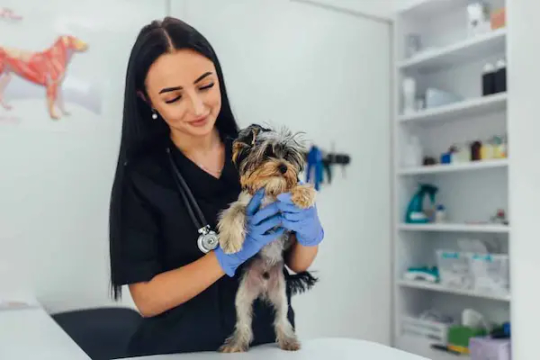
Regular veterinary check-ups are crucial for maintaining your Yorkie's health and detecting any potential health issues early. Yorkies require vaccines, preventative care, dental care, and regular check-ups to ensure they remain healthy and happy. Neglecting your Yorkie's healthcare needs can lead to complications that can shorten their lifespan.
Lifestyle
Finally, lifestyle factors can impact your Yorkie's lifespan. Exposure to toxins, stress, and environmental factors can all contribute to health problems and lower life expectancy. Creating a safe, loving, and stress-free environment for your Yorkie can help them live a longer, happier life.
Increasing Yorkshire Terrier Lifespan: Tips for Prolonging Your Yorkie's Life
As Yorkie owners, we want our furry companions to live a long and healthy life by our side. Fortunately, there are several practical tips and strategies that we can implement to improve their longevity and quality of life. Here are some tips to increase your Yorkshire Terrier's lifespan:
- Proper Nutrition: A balanced and nutritious diet is crucial for your Yorkie's overall health and well-being. Consult with your veterinarian to determine the best diet for your dog based on their age, size, and any health issues.
- Regular Exercise: Regular exercise not only benefits your Yorkie's physical health but also their mental and emotional well-being. Provide daily opportunities for exercise, such as walks, playtime, and training sessions.
- Regular Veterinary Check-Ups: Regular check-ups with your veterinarian can help detect any health issues early on and prevent them from becoming more serious. Follow your vet's recommendations for check-up frequency based on your dog's age and any underlying health issues.
- Dental Care: Dental hygiene is important for your Yorkie's overall health and can help prevent dental diseases that can impact their lifespan. Provide regular teeth brushing, dental chews, and annual dental cleanings with your vet.
- Socialization: Yorkies thrive on human companionship and socialization with other dogs. Provide regular opportunities for socialization to help prevent anxiety and behavioral issues that can affect their lifespan.
- Stress Management: Stress can have a significant impact on your Yorkie's health and lifespan. Implement stress management techniques, such as providing a calm and secure environment, using positive reinforcement for training, and minimizing exposure to stressful situations.
Cautions
While implementing these tips can greatly increase your Yorkie's lifespan, it is important to exercise caution in certain areas. For example, avoid overfeeding your dog, which can lead to obesity and related health issues. Additionally, be cautious of extreme temperatures and exposure to toxins and chemicals that can harm your dog's health.
Caring for Aging Yorkies
As our beloved Yorkies grow older, it is important to make adjustments to their care routine to ensure they are comfortable and happy in their golden years. The average Yorkie life span ranges from 12 to 15 years, which means that they may start showing signs of aging as early as seven years old.
Diet Modifications
One of the first considerations for caring for aging Yorkies is their diet. Older dogs have different nutritional needs than younger dogs, and it is important to adjust their diet accordingly. Talk to your vet about incorporating more senior dog food into their diet, which is specially formulated to support their aging bodies.
Exercise Adjustments
As Yorkies age, they may not be able to keep up with the same level of exercise as they used to. Adjust their exercise routine to include lower-impact activities such as short walks or gentle playtime. Exercise is still important to maintain their weight and overall health, but it should be tailored to their abilities.
Potential Health Issues
As Yorkies age, they may become more prone to health issues such as arthritis, dental issues, and vision and hearing loss. Schedule regular vet check-ups to catch any potential issues early and take preventative measures when possible.
Potential Health Issues in Aging YorkiesSymptoms to Watch ForPreventative MeasuresArthritisLimping, stiffness, difficulty standing or sittingLow-impact exercise, joint supplements, pain managementDental IssuesBad breath, tooth loss, bleeding gumsRegular dental checkups, dental cleaning, appropriate chew toysVision and Hearing LossBumping into things, not responding to soundsRegular vet check-ups, proper eye and ear care
Comfort and Support
In addition to modifying their diet and exercise routine, it is also important to provide a comfortable and supportive environment for aging Yorkies. Invest in a comfortable bed to support their aging joints, provide plenty of mental stimulation and socialization, and give them the love and attention they deserve.
By making these adjustments to our Yorkie's care routine, we can ensure they enjoy a comfortable and fulfilling life during their golden years.
Understanding Common Health Issues in Yorkies
As loving Yorkie owners, it's important to be aware of the common health issues that can affect our furry companions. While not all Yorkies will experience these health issues, being knowledgeable and proactive can help ensure that our pets will live happy and healthy lives.
Dental Issues
Yorkies are prone to dental problems, including dental tartar, plaque buildup, and tooth decay. These issues can lead to gum disease, which in turn can cause bleeding, pain, and tooth loss. Regular dental check-ups and professional cleanings can help prevent these issues.
Hip Dysplasia
Hip dysplasia is a genetic condition that affects many breeds, including Yorkies. This condition occurs when the hip joint doesn't form correctly, which can cause arthritis and pain. Regular exercise and maintaining a healthy weight can help prevent the progression of hip dysplasia.
Patellar Luxation
Patellar luxation is a condition where the kneecap dislocates from its normal position, causing lameness and pain. This condition can be caused by genetics, trauma, or injury. Surgery can often correct this condition, but in some cases, ongoing monitoring and management may be necessary.
Tracheal Collapse
Tracheal collapse is a condition where the cartilage rings in the trachea weaken, causing the airway to flatten, and making it difficult for the dog to breathe. While this condition can occur in any breed, it is more common in smaller dogs, including Yorkies. Weight management and avoiding activities that strain the airway can help prevent this condition.
Heart Disease
Yorkies are also prone to heart disease, including patent ductus arteriosus, mitral valve disease, and cardiomyopathy. Signs of heart disease can include coughing, lethargy, and difficulty breathing. Early detection and treatment are crucial for managing heart disease.
Maintaining Health and Preventing Issues
While it's important to be aware of common health issues that can affect Yorkies, much can be done to maintain their overall health and prevent issues from arising. Regular veterinary check-ups, a healthy diet, regular exercise, and grooming can all contribute to your Yorkie's well-being. By understanding their specific needs and taking proactive measures, you can help ensure that your furry friend stays happy and healthy for years to come.
Ensuring a Happy and Healthy Lifestyle for Your Yorkie
As loving Yorkie owners, we all want our furry companions to live happy and healthy lives. By following these tips, we can ensure that our Yorkies enjoy a long and fulfilling lifespan.
Provide Mental Stimulation
Yorkies are intelligent dogs and need mental stimulation to prevent boredom and promote their overall well-being. Consider providing puzzle toys or teaching new tricks to keep your Yorkie's mind engaged and sharp.
Regular Exercise

Regular exercise is important for your Yorkie's physical and mental health. A daily walk or playtime can help prevent obesity, strengthen their muscles, and alleviate stress. Consult with your veterinarian to determine the right level of activity for your Yorkie based on their age and health conditions.
Groom Your Yorkie Regularly
Regular grooming is crucial for your Yorkie's hygiene and comfort. Brushing their coat, trimming their nails, and cleaning their ears can help prevent infections and keep your Yorkie clean. Find a grooming routine that works for both you and your pup, and stick to it regularly.
Regular Dental Care
Yorkies are prone to dental problems such as dental decay and gum disease. Regular dental care can help prevent these issues and promote your Yorkie's overall health and well-being. Consider brushing their teeth daily, using dental chews, or scheduling regular professional cleanings.
Provide a Balanced Diet
A balanced diet is crucial for your Yorkie's health and longevity. Provide high-quality food that is specifically formulated for their needs and avoid overfeeding or giving them food that is harmful to their health. Consult with your veterinarian to determine the right diet for your Yorkie.
Socialization
Yorkies are social dogs and need regular interaction with other dogs and humans to prevent isolation and anxiety. Consider taking your Yorkie to dog parks or socializing them with other friendly dogs. Engage in playtime and cuddles to strengthen your bond with your furry friend.
By following these tips, we can ensure that our Yorkies receive the love, care, and attention they need to live long and happy lives. Let's do our part to give our furry friends the best possible life!
Longevity Tips for Yorkie Owners
As loving Yorkie owners, we all want our furry companions to live long and happy lives. Here are some tips to promote the longevity of your Yorkie:
- Provide proper nutrition: A balanced diet is essential for a healthy Yorkie. Consult with your veterinarian to determine the best food options and portion sizes for your furry friend.
- Exercise regularly: Yorkies may be small, but they still need regular exercise to maintain good health. Take your Yorkie for daily walks and engage them in playtime to promote physical and mental stimulation.
- Regular veterinary check-ups: Annual check-ups and preventative care can catch health issues early and contribute to a longer life for your Yorkie.
- Stay up-to-date on vaccinations and preventative treatments: Ensure your Yorkie is protected against common diseases and parasites by staying current on vaccinations and preventative treatments recommended by your vet.
- Provide mental stimulation: Yorkies are intelligent dogs that need mental stimulation to keep them happy and healthy. Engage your Yorkie with toys, games, and training exercises that challenge their minds.
- Reduce stress: Stress can have negative effects on a Yorkie's health and life expectancy. Create a calm and supportive environment for your furry companion by minimizing stressors and providing plenty of love and attention.
- Dental care: Dental problems can be a significant health concern for Yorkies. Ensure your Yorkie's teeth and gums stay healthy with regular brushing and dental cleanings.
By following these tips and providing your Yorkie with love, attention, and proper care, you can help ensure your furry companion enjoys a long and fulfilling life. Remember, every Yorkie is unique, and their individual needs should always be considered when determining the best practices for their well-being.
Conclusion
As Yorkie lovers, we want our furry companions to enjoy a happy and healthy life for as long as possible. By understanding the factors that can influence their lifespan, and taking proactive steps to optimize their care and environment, we can help ensure they live a long and fulfilling life.
Final Thoughts
While genetics certainly play a role in determining a Yorkie's lifespan, we have the power to positively impact their health and well-being through proper nutrition, exercise, and healthcare. By staying informed and taking an active role in their care, we can help ensure our beloved companions enjoy a long and happy life by our side.
Thank you for joining us in this ultimate guide to how long Yorkies live. We hope you found it informative and useful in caring for your furry friend. Here's to many more happy years with our beloved Yorkies!
Read the full article
0 notes
Text
Understanding Seizures in Yorkshire Terriers: The Causes, Symptoms, and Treatments

Seizures in Yorkshire Terriers can be a concerning topic for many dog owners. Seizures can be caused by a variety of medical conditions and can lead to serious health issues if left untreated. It is important for dog owners to be aware of the signs and symptoms of seizures in Yorkshire Terriers to ensure that their pets receive the proper care and treatment.
Understanding Seizures in Yorkshire Terriers is crucial for pet owners. Seizures can be caused by a variety of factors, including genetics, liver disease, and brain tumors. It is important for dog owners to be aware of these potential causes and to seek veterinary care if their pet experiences seizures. With the right guidance and care, it is possible for Yorkshire Terriers to lead a seizure-free life.
Key Takeaways
- Seizures in Yorkshire Terriers can be caused by a variety of medical conditions and can lead to serious health issues if left untreated.
- Understanding the potential causes of seizures in Yorkshire Terriers is crucial for pet owners.
- With the right guidance and care, it is possible for Yorkshire Terriers to lead a seizure-free life.
Understanding Seizures in Yorkshire Terriers
Yorkshire Terriers are prone to seizures, which can be a puzzling and concerning topic for pet owners. In this section, we will discuss the causes, types, symptoms, and signs of seizures in Yorkshire Terriers.
Causes of Seizures
There are many different causes of seizures in Yorkshire Terriers. Some of the most common causes include genetic predisposition, idiopathic epilepsy, and symptomatic epilepsy. Other causes may include brain tumors, head trauma, liver disease, kidney failure, and exposure to toxins.
Types of Seizures
There are several types of seizures that can affect Yorkshire Terriers. These include focal seizures, generalized seizures, and psychomotor seizures. Focal seizures are characterized by abnormal limb movements on one side of the body, while generalized seizures affect the entire brain and can cause convulsions and loss of consciousness. Psychomotor seizures are characterized by abnormal behavior, such as excessive licking or biting.
Symptoms and Signs of Seizure
Symptoms and signs of seizure in Yorkshire Terriers can vary depending on the type and severity of the seizure. Some common symptoms include sudden collapse, loss of consciousness, stiffening of the limbs, drooling, and foaming at the mouth. Other signs may include uncontrolled urination or defecation, abnormal eye movements, and vocalizations.
If your Yorkshire Terrier experiences a seizure, it is important to remain calm and keep them safe from harm. Move any objects that could cause injury out of the way, and do not attempt to restrain your dog. Instead, wait for the seizure to pass and then seek veterinary care if necessary.
In conclusion, seizures in Yorkshire Terriers can be a challenging issue for pet owners to manage. By understanding the causes, types, symptoms, and signs of seizures, you can better care for your furry friend and seek appropriate treatment if necessary.
Medical Conditions Leading to Seizures
Seizures in Yorkshire Terriers can be caused by a variety of medical conditions. In this section, we will discuss some of the most common medical conditions that can lead to seizures in Yorkies.
Liver Shunt
A liver shunt is a congenital abnormality where the liver is not able to properly filter toxins from the blood. This can lead to a buildup of toxins in the bloodstream, which can cause seizures. Yorkies with liver shunts may also display symptoms such as stunted growth, vomiting, and diarrhea. Diagnosis of a liver shunt can be done through blood tests and ultrasound. Treatment may involve surgery to correct the abnormality.
Hypoglycemia
Hypoglycemia, or low blood sugar, can also cause seizures in Yorkies. This is especially common in young puppies who have not yet developed the ability to regulate their blood sugar levels. Symptoms of hypoglycemia include lethargy, weakness, and seizures. Treatment may involve administering glucose or sugar to raise blood sugar levels.
Brain Tumors
Brain tumors can also cause seizures in Yorkies. These tumors can be either benign or malignant and can develop in various parts of the brain. Symptoms of brain tumors may include seizures, changes in behavior, and loss of coordination. Diagnosis of a brain tumor may involve MRI or CT scans. Treatment may involve surgery, radiation therapy, or chemotherapy.
It's important to note that these are not the only medical conditions that can lead to seizures in Yorkies. Other conditions such as kidney disease, hydrocephalus, and cerebrospinal fluid abnormalities may also cause seizures. If your Yorkie is experiencing seizures, it's important to consult with a veterinarian to determine the underlying cause and appropriate treatment.
Treatment and Management of Seizures
When it comes to treating seizures in Yorkshire Terriers, there are a few different options available. The best treatment plan will depend on the severity and frequency of the seizures, as well as any underlying health conditions that may be contributing to the problem. In this section, we'll take a closer look at some of the most common treatment options for seizures in Yorkies.
Medication
One of the most common treatments for seizures in dogs is medication. There are several different medications that may be prescribed to help manage seizures in Yorkshire Terriers, including phenobarbital, potassium bromide, and Keppra. These medications work by reducing the frequency and severity of seizures, and they may be used alone or in combination with other treatments.
Phenobarbital is one of the most commonly prescribed medications for seizures in dogs, including Yorkies. It is an anticonvulsant that works by slowing down the activity in the brain that can lead to seizures. While phenobarbital can be very effective at managing seizures, it can also have some side effects, including increased thirst and appetite, lethargy, and difficulty walking.
Potassium bromide is another medication that may be used to treat seizures in Yorkies. It is also an anticonvulsant, and it works by reducing the activity of certain chemicals in the brain that can trigger seizures. Potassium bromide can be very effective at managing seizures, but it can also have some side effects, including vomiting, diarrhea, and loss of appetite.
Keppra is a newer medication that may be used to treat seizures in Yorkies. It works by reducing the activity of certain chemicals in the brain that can trigger seizures. Keppra is generally well-tolerated by dogs, and it has fewer side effects than some other medications. However, it can be more expensive than other options.
Surgery
In some cases, surgery may be recommended to treat seizures in Yorkshire Terriers. This is usually only considered when other treatment options have been unsuccessful, and when the seizures are caused by a specific underlying condition, such as a brain tumor.
Surgery can be a very effective way to manage seizures in Yorkies, but it is also a very invasive and risky procedure. It should only be considered as a last resort, and only after a thorough evaluation by a veterinary neurologist.
Lifestyle Changes
In addition to medication and surgery, there are also some lifestyle changes that may help manage seizures in Yorkies. These can include changes to the dog's feeding schedule, as well as the addition of supplements like omega-3 fatty acids.
Feeding your Yorkie smaller, more frequent meals throughout the day can help stabilize blood sugar levels, which can in turn help reduce the frequency of seizures. Omega-3 fatty acids, which are found in fish oil supplements, may also help reduce inflammation in the brain, which can be a contributing factor in seizures.
Overall, the best treatment plan for seizures in Yorkshire Terriers will depend on a variety of factors, including the severity and frequency of the seizures, as well as any underlying health conditions that may be contributing to the problem. With the right treatment plan in place, however, it is possible to manage seizures and help improve your Yorkie's quality of life.
Prevention and Safety Measures
Seizures in Yorkshire Terriers can be scary and unpredictable, but there are steps we can take to help prevent them from happening. In this section, we will discuss some of the most important prevention and safety measures that you can take to keep your Yorkie healthy and safe.
Training
One of the most important things you can do to prevent seizures in your Yorkie is to train them well. This includes teaching them basic obedience commands, such as sit, stay, and come, as well as ensuring that they are socialized properly. A well-trained Yorkie is less likely to become stressed or anxious, which can trigger seizures.
Monitoring
Monitoring your Yorkie's behavior and health is also crucial in preventing seizures. Keep an eye out for any changes in behavior, such as lethargy, confusion, or disorientation. If you notice any of these symptoms, it's important to take your Yorkie to the vet as soon as possible.
Lead Safety
Another important safety measure is to ensure that your Yorkie is always on a lead when outside, as this can help prevent falls and trauma. Additionally, make sure that your Yorkie is always supervised when outside, as they can be prone to eating toxic substances, such as rat poison or chocolate.
Toxin and Poison Safety
Speaking of toxins and poisons, it's important to keep these substances out of reach of your Yorkie. This includes flea powder, which can be toxic if ingested, as well as any household cleaners or chemicals. If you suspect that your Yorkie has ingested something toxic, seek veterinary attention immediately.
Lyme Disease Prevention
Lyme disease is a tick-borne illness that can cause seizures in dogs. To prevent Lyme disease, make sure that your Yorkie is always up-to-date on their tick prevention medication, and check them for ticks regularly.
Electrolyte Balance
Electrolyte imbalances can also trigger seizures in dogs. To maintain proper electrolyte balance, make sure that your Yorkie has access to clean, fresh water at all times, and feed them a well-balanced, nutritious diet.
Stress Management
Stress can also be a trigger for seizures in Yorkies. To help manage stress, make sure that your Yorkie has a comfortable and safe space to retreat to when feeling anxious or overwhelmed.
Temperature Control
Finally, it's important to keep your Yorkie's body temperature regulated, as overheating or hypothermia can also trigger seizures. Make sure that your Yorkie has access to a cool, shaded area in the summer, and a warm, cozy space in the winter.
By following these prevention and safety measures, you can help keep your Yorkie healthy and seizure-free. Remember, if you ever suspect that your Yorkie is experiencing a seizure, seek veterinary attention immediately.
Read the full article
0 notes
Text
Do Yorkies Shed? Are Yorkies Hypoallergenic? – The Factual Guide
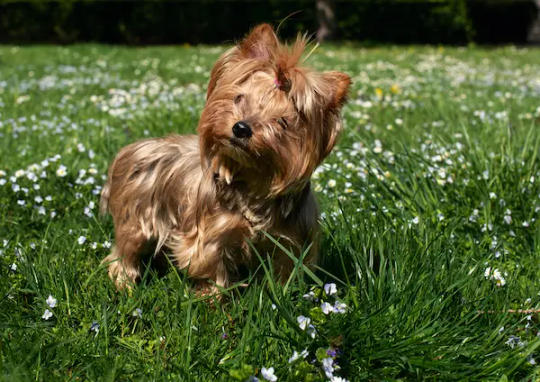
Yorkshire Terriers, affectionately known as Yorkies, are a popular dog breed often admired for their small size and elegant appearance. Many potential dog owners wonder if Yorkies shed and whether they are a hypoallergenic breed. The good news is that Yorkies do not shed to the same extent as many furrier breeds due to their long, silky coat. This unique coat is one of the reasons why Yorkies are considered a more hypoallergenic option for individuals with allergies.
While the coat of a Yorkie is more similar to human hair than fur, it is not the hair itself that typically causes allergic reactions. Instead, it's the dead skin, or dander, shed with the hair. Yorkies release significantly less dander than other breeds, making them a better choice for allergy sufferers. Additionally, the proper grooming and care of a Yorkie is crucial for maintaining its hypoallergenic qualities.
Key Takeaways
- Yorkies have a long, silky coat that sheds less than other dog breeds, making them a more hypoallergenic option.
- Allergic reactions are usually caused by dander, not hair, and Yorkies release significantly less dander.
- Regular grooming and care are essential for maintaining a Yorkie's hypoallergenic qualities.
Understanding Yorkies and Shedding
PlayUnderstanding Yorkshire Terrier Shedding and Hypoallergenicity
Are Yorkies Hypoallergenic?
Yorkshire Terriers, commonly known as Yorkies, are a popular breed among dog lovers. With their small size, lively personalities, and adorable appearance, it's easy to see why they catch people's attention. One question many potential owners may have is whether or not Yorkies shed. In this section, we will discuss the shedding habits of these little dogs and explore their hypoallergenic nature.

Yorkie sitting in the grass
In a word, yes, Yorkies do shed, but not to the same degree as furrier dogs. To understand their shedding habits, we need to consider their coat. Most dog breeds have a double coat, which consists of a thicker, coarser outer coat and a softer, finer inner layer. This double-coat system helps protect the dog from harsh weather conditions. However, Yorkies have a single coat, which consists of fine, silky hair that closely resembles human hair.
This single coat is one reason why Yorkies can be classified as a hypoallergenic breed. Hypoallergenic dogs produce less dander and are less likely to cause an allergic reaction, as dander is the primary source of allergens. Dander is essentially the dead skin cells that are shed alongside dog hair. Yorkies do produce dander, but they rarely have excessive shedding due to their single coat, making them suitable for people with allergies.
Yorkies' shedding cycle is different from dogs with double coats. Instead of shedding hair in large quantities during specific periods, they lose hair in a more continuous manner. Hair loss occurs as part of the natural hair growth cycle, which consists of shedding old, dead hair and regrowing new strands. This cycle is influenced by factors like genetics, hormones, and environmental conditions.
To minimize shedding, proper grooming is essential for Yorkies. Regular brushing can help remove loose hair and dead skin, making it less likely for these particles to end up on your furniture or clothes. Additionally, grooming should prevent their fine hair from becoming tangled or matted, reducing the chances of further hair loss.
In summary, while Yorkies do shed, their single coat and unique shedding cycle make them a suitable option for individuals with allergies. By maintaining proper grooming and care, Yorkies can continue to be a loving and friendly companion for years to come.
Characteristics of A Hypoallergenic Dog Breed

When it comes to hypoallergenic dogs, there are certain traits and characteristics that make them uniquely suitable for people with allergies. One of the primary factors is the amount of allergens found in a dog's coat, which mainly come from proteins in their dander, saliva, and urine. Hypoallergenic dog breeds are known to produce fewer allergens, thus reducing the risk of triggering allergic reactions.
Popular hypoallergenic dog breeds include the Bichon Frise, Poodle, and Maltese. These breeds are often small in size, which can further minimize the allergens spread in the environment. Apart from size, the temperament and intelligence of these breeds make them excellent companions for allergy sufferers.
A key factor that contributes to a dog being hypoallergenic is the type of coat they have. Many hypoallergenic breeds have double coats that don't shed as much as other breeds. This characteristic helps in trapping the allergens within their fur, preventing them from becoming airborne. Regular grooming and maintenance of their coats ensure that the allergens remain under control.
In addition to the coat type, hypoallergenic dog breeds tend to have fewer issues with parasites, which can also be a source of allergens. A well-cared-for hypoallergenic dog will have reduced chances of contracting parasites, thus making them a safer option for those with allergies.
However, it's essential to remember that no dog breed is entirely allergen-free. Hypoallergenic just means that these breeds produce fewer allergens, decreasing the likelihood of causing an allergic reaction. Each individual's response to a specific dog breed may vary, and it's crucial to spend time with the breed of interest before committing to adoption or purchase.
In conclusion, hypoallergenic dog breeds offer a better chance for allergy sufferers to enjoy the companionship of a furry friend. By understanding the characteristics that make a dog hypoallergenic, such as coat type, size, temperament, and grooming requirements, we can make an informed decision when choosing the best breed for our needs.
Grooming and Care Requirements for Yorkies
Caring for a Yorkshire Terrier requires regular grooming to maintain its silky coat and overall health. We recommend brushing their coat daily using a pin brush to avoid matting. Matting can cause discomfort and even lead to skin issues like redness, irritation, and infections. Daily brushing can help keep their coat shiny and tangle-free.
Bathing your Yorkie should be done every three to four weeks to keep their skin clean and healthy. Be mindful of the water temperature, as harsh heat can damage their coat and cause stress to your dog. Choose a mild dog shampoo to ensure gentleness on their skin, and check for fleas during the process.
Nutrition plays a crucial role in maintaining a healthy coat. Yorkies require balanced, high-quality food to maintain their low-shedding nature and reduce shedding-related issues. Providing proper nutrition can also help in preventing diseases, illness, and stress that can affect their coat's health.
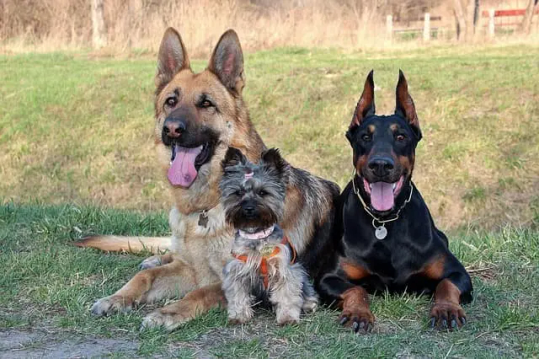
Yorkie sitting with German Shepherd and Doberman
Regular grooming visits are essential for Yorkies, especially if you want to maintain a specific style for your dog, such as the popular puppy cut. A professional groomer has the experience and grooming tools to provide the best care for your Yorkie.
Lastly, it's crucial to monitor your Yorkie's overall health, as illnesses and stress can sometimes manifest through coat problems and excessive shedding. Regular vet check-ups help prevent and detect such issues early on, ensuring the well-being of your lovely companion.
In conclusion, while Yorkies are considered low-shedding and relatively hypoallergenic, proper grooming and care are essential to maintain their attractive, silky coat and general health. With daily brushing, monthly bathing, proper nutrition, and regular vet visits, your Yorkie will continue to shine both inside and out.
Allergy Management for Yorkie Owners
As Yorkie owners or prospective owners, we understand that it's crucial to manage allergies effectively, especially for those who suffer from dog allergies. While Yorkies are considered hypoallergenic, they still produce allergens such as dander, saliva, and urine. Let's explore some useful tips and best practices in allergy management for Yorkie owners.

We believe that maintaining cleanliness is essential for reducing exposure to allergens. Regular grooming of our Yorkies, including brushing and washing, can help minimize dandruff and shedding. It's also important to keep our living spaces clean and tidy. Vacuuming carpets, wiping surfaces, and laundering pet bedding regularly are all practical steps we can take to reduce allergen accumulation.
Investing in a HEPA air purifier can significantly improve the air quality in our homes. These air purifiers are designed to remove particles as small as 0.3 microns, which includes pet dander and other allergens. Plus, choosing a portable air purifier allows us to place it in any area of our home, particularly the bedroom, where we might experience allergy symptoms such as sneezing, watery eyes, or a runny nose.
When it comes to managing pet allergies, we also need to be mindful of our own hygiene. Washing our hands after petting our Yorkies and avoiding touching our face can help minimize exposure to allergens. Additionally, it's a good idea to establish some pet-free zones in our home, especially bedrooms, to create a safe space for allergy sufferers.
In conclusion, having a Yorkie as a pet, even if we or someone in our household has allergies, is possible. By implementing these allergy management strategies and maintaining a clean environment, we can effectively minimize health issues related to pet allergens.
Read the full article
#areyorkieshypoallergenic#dobichonyorkiesshed#dobieweryorkiesshed#domalteseyorkiesshed#dominiyorkiesshed#dopartiyorkiesshed#doteacupyorkiesshed#doteacupyorkiesshedalot#doyorkiesshed#doyorkiesshedalotofhair#doyorkiesshedawintercoat#doyorkiesshedbad#doyorkiessheddander#doyorkiesshedinthesummer#doyorkiesshedinthewinter#doyorkiesshedtheirpuppycoat#doyorkiesshedtheirpuppyhair#doesteacupyorkiesshed#doesyorkiesshed#howoftendoyorkiesshed
0 notes
Text
Are Yorkies High Maintenance? A Clear and Neutral Answer

Are Yorkies high maintenance? This is a question that many potential pet owners ask themselves before bringing home this adorable breed. Yorkshire Terriers, are small dogs that are known for their long, silky coats and spunky personalities. While they make great companions, it's important to understand the level of care that they require.
Understanding the Yorkshire Terrier breed is key to answering the question of whether they are high maintenance. Yorkies are energetic and playful dogs that require daily exercise and mental stimulation. They are also prone to certain health issues, such as dental problems, hypoglycemia, and luxating patella. In terms of grooming, they have long, flowing coats that require regular brushing and trimming to prevent matting and tangling.
Key Takeaways:
- Yorkshire Terriers require daily exercise and mental stimulation to stay healthy and happy.
- Grooming is an important aspect of caring for a Yorkie, as their long coats require regular brushing and trimming.
- Potential Yorkie owners should be aware of the breed's health concerns and be prepared to provide regular veterinary care.
Are Yorkies high maintenance?
https://www.youtube.com/watch?v=TYLfAxKX3Bg&embed=true
Yorkshire Terriers, are a popular breed of small dogs that are known for their cute looks and charming personalities. However, many people wonder whether they are high maintenance pets. In this section, we will take a closer look at the grooming needs and other requirements of the Yorkshire Terrier to determine whether they are indeed high maintenance dogs.
Grooming Needs
One of the main concerns when it comes to Yorkies is their grooming needs. This dog breed has a long, silky coat that requires regular brushing and trimming to keep it healthy and shiny. If their coat is not properly maintained, it can become matted and tangled, which can lead to skin irritation and other health problems.
In addition to regular brushing, they also need to be bathed and have their nails trimmed on a regular basis. This can be time-consuming and requires some skill, so it is important to be prepared for the grooming needs of a Yorkie before adopting one.
Other Requirements
In addition to grooming needs, they have other requirements that should be considered when deciding whether they are high maintenance dogs. For example, they are a high-energy breed that requires daily exercise to stay healthy and happy. This can be as simple as a short walk or playtime in the backyard, but it is important to make sure that they get enough exercise to prevent boredom and destructive behavior.
They also need a healthy diet that is tailored to their specific needs. This means feeding them high-quality dog food that is free of fillers and other additives that can be harmful to their health.
Conclusion
Overall, while Yorkies do require some extra care and attention when it comes to grooming and exercise, they are not necessarily high maintenance dogs. With proper care and attention, they can be wonderful pets that bring joy and companionship to their owners.
Understanding the Yorkie Breed

As a breed, Yorkshire Terriers are known for their small size and big personality. They are a popular breed due to their cute appearance and affectionate nature. However, before deciding to get a Yorkie, it's important to understand their characteristics and needs.
Physical Characteristics
Yorkies are a small breed in the canine world, typically weighing between 4-7 pounds and standing 6-9 inches tall at the shoulder. They have a long, silky coat that comes in a variety of colors, including black, tan, and blue. Their ears stand upright and their tails are typically docked.
Temperament
Yorkshire Terriers are known for their affectionate and playful personalities. They love attention and enjoy being around their owners. However, they can also be stubborn and independent at times. They can be wary of strangers and may bark excessively if not properly socialized.
Grooming
Yorkies require regular grooming to keep their long coats looking healthy and shiny. This includes daily brushing to prevent matting and regular trips to the groomer for haircuts. They are also prone to tooth decay, so regular dental care is important.
Exercise
While Yorkies are small, they still require daily exercise to stay healthy and happy. They enjoy short walks and playtime indoors. However, they are not well-suited for long hikes or strenuous exercise.
Health Issues
As with all breeds, Yorkies are prone to certain health issues. These include dental problems, hypoglycemia, and collapsed trachea. It's important to work with a reputable breeder and schedule regular check-ups with a veterinarian to ensure your Yorkie stays healthy.
Overall, they are a high-maintenance breed due to their grooming needs and potential health issues. However, their affectionate personalities and cute appearance make them a popular choice for many dog lovers.
Identifying High Maintenance Traits
When it comes to identifying high maintenance traits in Yorkies, there are several factors to consider. Here are some of the key traits that may indicate a Yorkie is high maintenance:
Coat Maintenance
Yorkies are known for their beautiful, silky coats. However, this also means that their coats require regular maintenance to keep them looking their best. They need to be brushed daily, and their coats may also require regular trimming and grooming to prevent matting and tangling.
Exercise Needs
Yorkies may be small lap dogs but they are also active and energetic dogs. They require regular exercise to stay healthy and happy. This can include daily walks, playtime, and other forms of physical activity.
Health Concerns
Yorkies can be prone to a variety of health issues, including dental problems, eye issues, and skin allergies. This means that they may require regular vet visits and specialized care to keep them healthy.
Training and Socialization
Yorkies are intelligent dogs, but they can also be stubborn and independent. This means that they may require more training and socialization than some other breeds to ensure they are well-behaved and well-adjusted.
Overall, while these dogs can be wonderful pets, they do require a certain level of care and attention to keep them healthy and happy. If you are considering adding a Yorkie to your family, it is important to be prepared for the potential high maintenance requirements that come with this breed.
Grooming Needs of Yorkies
Yorkies are known for their long, silky hair that requires regular grooming. In this section, we will discuss the specific grooming needs.
Shedding and Brushing
One of the reasons Yorkies are a popular breed is because they are low-shedding and hypoallergenic. However, their long hair still requires daily brushing to prevent matting and tangling. Brushing your Yorkie's hair daily will also help distribute natural oils throughout their coat, keeping it healthy and shiny.
It's important to use a brush specifically designed for Yorkshire Terriers, such as a pin brush or slicker brush. These brushes are gentle on their hair and won't cause any discomfort.
Frequent Grooming Sessions
In addition to daily brushing, they also require frequent grooming sessions. This includes trimming their hair, cleaning their ears, and trimming their nails.
They should be groomed every 6-8 weeks to keep their hair at a manageable length. During these grooming sessions, their hair can be trimmed into a "puppy cut" or a "teddy bear cut," which are shorter and easier to maintain.
Their ears should also be cleaned regularly to prevent infections. Use a cotton ball and ear cleaning solution to gently clean the inside of their ears.
Finally, their nails should be trimmed every 2-3 weeks to prevent overgrowth. Be sure to use dog-specific nail clippers and avoid cutting the quick, which can cause bleeding and discomfort.
Overall, Yorkies are high-maintenance when it comes to grooming. However, with proper care and attention, their long, silky hair can be a beautiful and unique feature of the breed.
Yorkies as Family Dogs

Yorkshire Terriers, are a popular breed of small dogs that make great family pets. They are known for their lively and affectionate personalities, which make them ideal companion dogs for families with children. In this section, we will discuss the size and weight as well as their temperament, to help you decide if they are the right fit for your family.
Size and Weight
Yorkies are small in size, weighing between 5 to 7 pounds on average. They are considered a toy breed and are one of the smallest dogs in the world. Their small size makes them perfect for families living in apartments or smaller homes, as they do not require a lot of space to move around in.
Temperament
Yorkies are known for their confident and affectionate personalities. They are loyal lapdogs who love nothing more than to spend time with their owners. They are also playful and energetic, making them great companions for children. However, they can be a bit bossy and barky at times, so it is important to train them properly from a young age.
Overall, Yorkies make great family pets for those who are looking for a small dog with a big personality. They are high-maintenance in regard to their grooming needs, but their affectionate and playful nature makes up for it. If you are considering getting a Yorkie, make sure to do your research and find a reputable breeder or rescue organization.
Health Concerns in Yorkies
As with any breed of dog, Yorkies are prone to certain health concerns. It's important to be aware of these issues and take steps to prevent them or treat them early on.
Common Diseases
One common health concern in Yorkies is liver shunt. This is a condition where the liver's blood supply is abnormal, leading to a buildup of toxins in the bloodstream. Symptoms of liver shunt can include vomiting, diarrhea, lethargy, and seizures. Treatment usually involves surgery to redirect blood flow and medication to manage symptoms.
Another issue that they may face is patellar luxation, where the kneecap moves out of place. This can cause limping, pain, and arthritis. In severe cases, surgery may be necessary to correct the issue.
Yorkies are also prone to ear infections due to their long, floppy ears. Regular cleaning and maintenance can help prevent these infections, but if they do occur, treatment with antibiotics or antifungal medication may be necessary.
Life Expectancy
On average, Yorkies have a lifespan of 12-15 years. However, this can vary depending on factors such as genetics, diet, and overall health. It's important to provide your Yorkie with proper nutrition, regular exercise, and routine veterinary care to help ensure a long and healthy life.
In summary, while they're generally healthy dogs, they are prone to certain health concerns such as liver shunt, patellar luxation, and ear infections. By staying aware of these issues and taking preventative measures, you can help ensure your Yorkie lives a long and happy life.
Training and Behavior of Yorkies
Yorkshire Terriers are known for their intelligence and independence. They can make great pets, but they can also be high-maintenance in terms of their grooming needs. However, grooming is not the only aspect of owning a Yorkie that requires attention. In this section, we will discuss their barking tendencies and training needs.
Barking Tendencies
One of the most common characteristics is their tendency to bark a lot. They are known to be barkers, and their small size does not stop them from trying to act like a big watchdog. While this can be a good trait for a watchdog, excessive barking can be a nuisance to neighbors and other people around them.
As a dog owner, it is important to understand that excessive barking is not a behavior that can be eliminated altogether. However, it can be controlled. One way to control barking is to train your Yorkie to stop barking on command. This can be achieved through consistent training and positive reinforcement.
Training Needs
Training a Yorkie can be challenging, but it is essential to ensure that they become well-behaved and obedient pets. Yorkies are intelligent dogs, but they can also be stubborn. They require a firm and consistent hand during training.
One of the most important aspects of training a Yorkie is socialization. Socialization helps them to become accustomed to different people, animals, and environments. It is important to start socializing your Yorkie from a young age, as it can help prevent behavioral problems later on.
Another important aspect of training a Yorkie is crate training. Crate training can help with housebreaking and can also provide a safe and comfortable space for your Yorkie to retreat to when they need some alone time.
In conclusion, Yorkies can make great pets, but they require attention and care. Understanding their barking tendencies and training needs is essential to ensure that they become well-behaved and obedient pets. With consistent training and positive reinforcement, your Yorkie can become a loving and loyal companion.
Choosing a Yorkie as Your Pet
If you are considering getting a Yorkie as your pet, there are a few things you should keep in mind before making your decision. As pet parents, it is important that we make informed decisions that are best for both us and our furry companions.
First and foremost, Yorkies are known for their high maintenance grooming needs. Their long, silky coat requires daily brushing to prevent matting and tangling. This can be time-consuming and may require professional grooming every few months. If you are willing to commit to the upkeep of their coat, a Yorkie can make a wonderful addition to your family.
Another factor to consider is their size. Yorkies are a small breed, typically weighing between 4-7 pounds. As with any small breed, they may be more fragile and require extra care and attention. They are also more suited to living in smaller spaces, such as apartments or condos.
Yorkies are known for their loyalty and affectionate nature. They make great companions and are well-suited for families with children or seniors. They are also adaptable to different lifestyles and can thrive in both urban and rural environments.
When looking to get a Yorkie, it is important to find a reputable breeder or rescue organization. You want to ensure that your new furry friend is healthy and has been well-cared for. Be prepared to pay a higher price for a purebred Yorkie from a reputable breeder, but keep in mind that this investment can save you money in the long run by avoiding potential health issues.
In conclusion, getting a Yorkie as your pet can be a rewarding experience if you are willing to commit to their high maintenance grooming needs and provide them with the care and attention they require. As prospective owners, it is important that we do our research and make informed decisions to ensure the best possible outcome for both us and our furry companions.
Frequently Asked Questions
What are some challenges of owning a Yorkie?
Owning a Yorkie can come with some challenges. Yorkies are known to be quite vocal and can bark excessively, which can be a problem for apartment dwellers or those with close neighbors. They can also be stubborn and difficult to train, which can be frustrating for first-time dog owners. Additionally, Yorkies are prone to separation anxiety, so they may not be the best choice for those who are away from home for long periods of time.
How much grooming do Yorkies require?
Yorkies have a long, silky coat that requires regular grooming to keep it healthy and free of tangles and mats. They should be brushed daily, and their coat should be trimmed every four to six weeks. Yorkies also require regular baths to keep their coat clean and shiny. Their teeth should be brushed regularly, and their nails should be trimmed as needed.
Are Yorkies prone to health issues?
Like all breeds, Yorkies are prone to certain health issues. Some of the most common health issues include dental problems, allergies, and luxating patellas (knee dislocation). Yorkies are also prone to hypoglycemia (low blood sugar), which can be life-threatening if not treated promptly. Regular visits to the vet can help catch any health issues early on.
What is the average lifespan of a Yorkie?
The AKC says the average lifespan of a Yorkie is around 12 to 15 years. However, with proper care and attention, some Yorkies have been known to live well into their late teens.
Do Yorkies require a lot of exercise?
While Yorkies are active little dogs, they don't require a lot of exercise. A daily walk and some playtime indoors should be enough to keep them happy and healthy. However, it's important to note that Yorkies can be prone to obesity, so it's important to monitor their diet and exercise to prevent weight gain.
Are Yorkies good apartment dogs?
Yes, Yorkies make great apartment dogs. They are small in size and don't require a lot of space to be happy. However, as mentioned earlier, they can be vocal and may bark excessively, which could be a problem for close neighbors. Proper training and socialization can help minimize this behavior.
Read the full article
0 notes